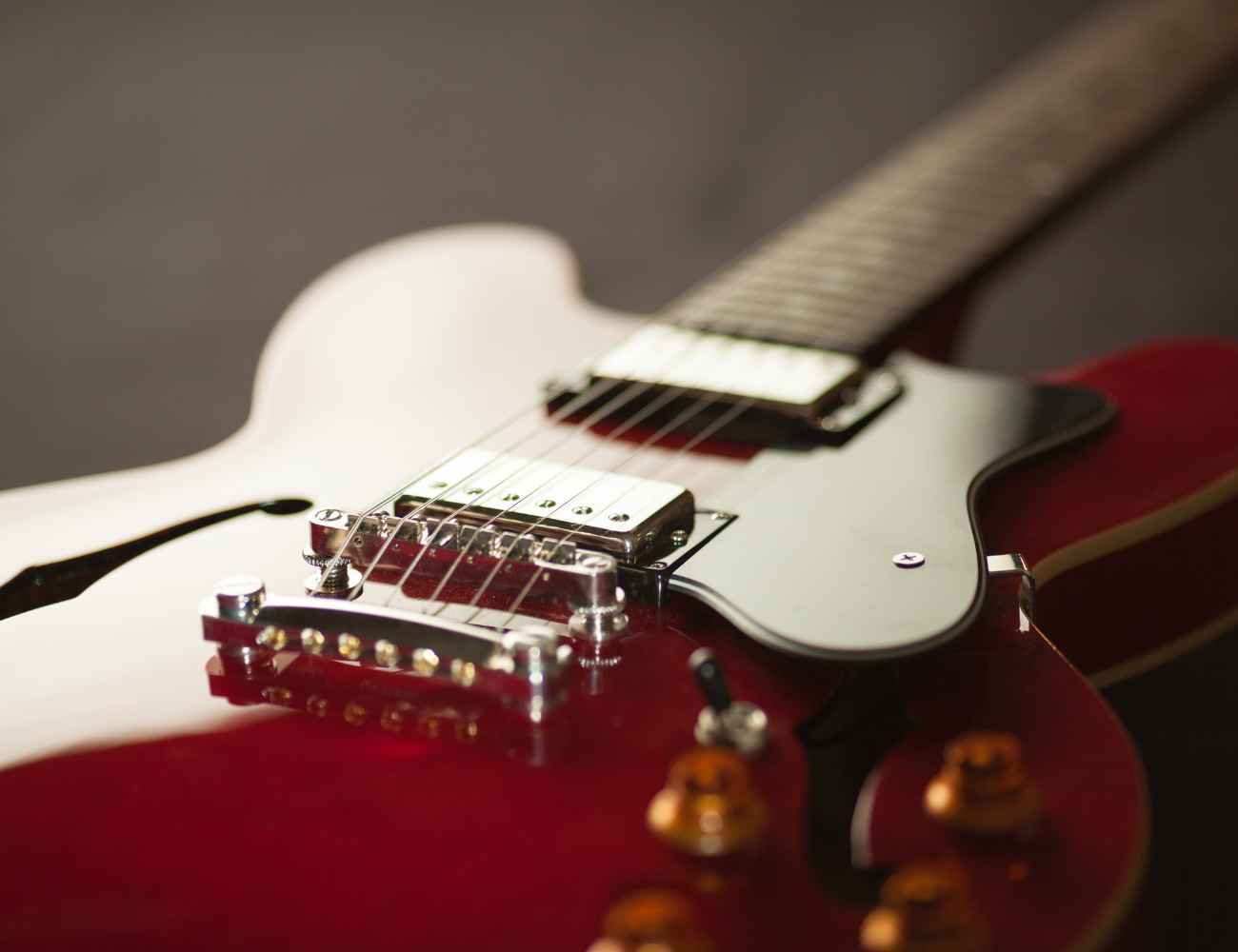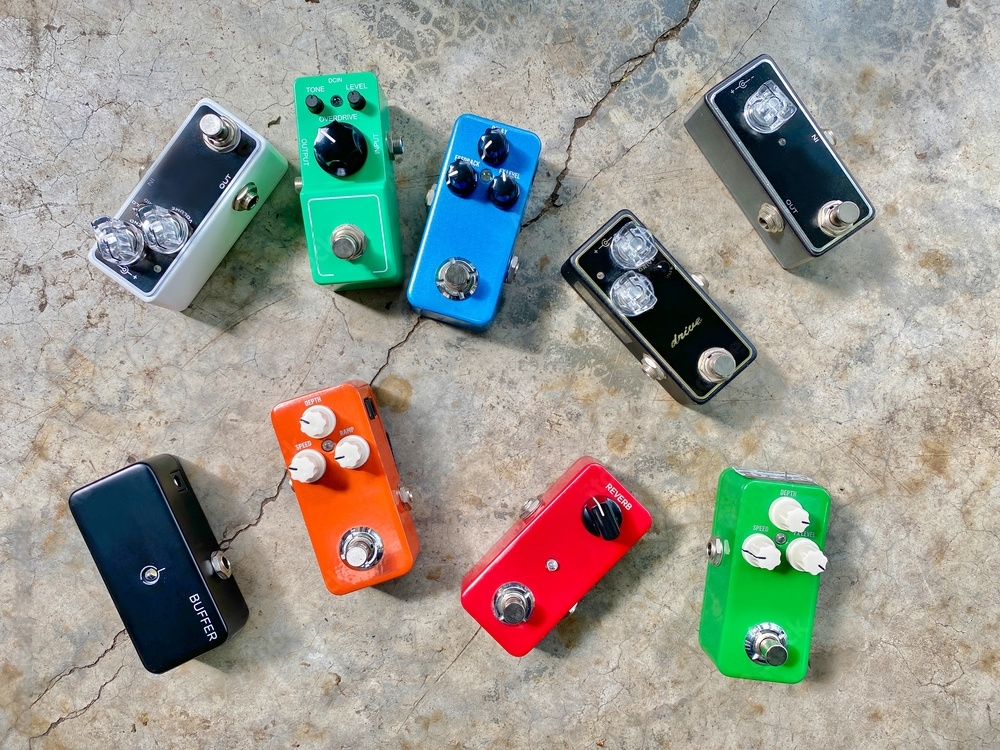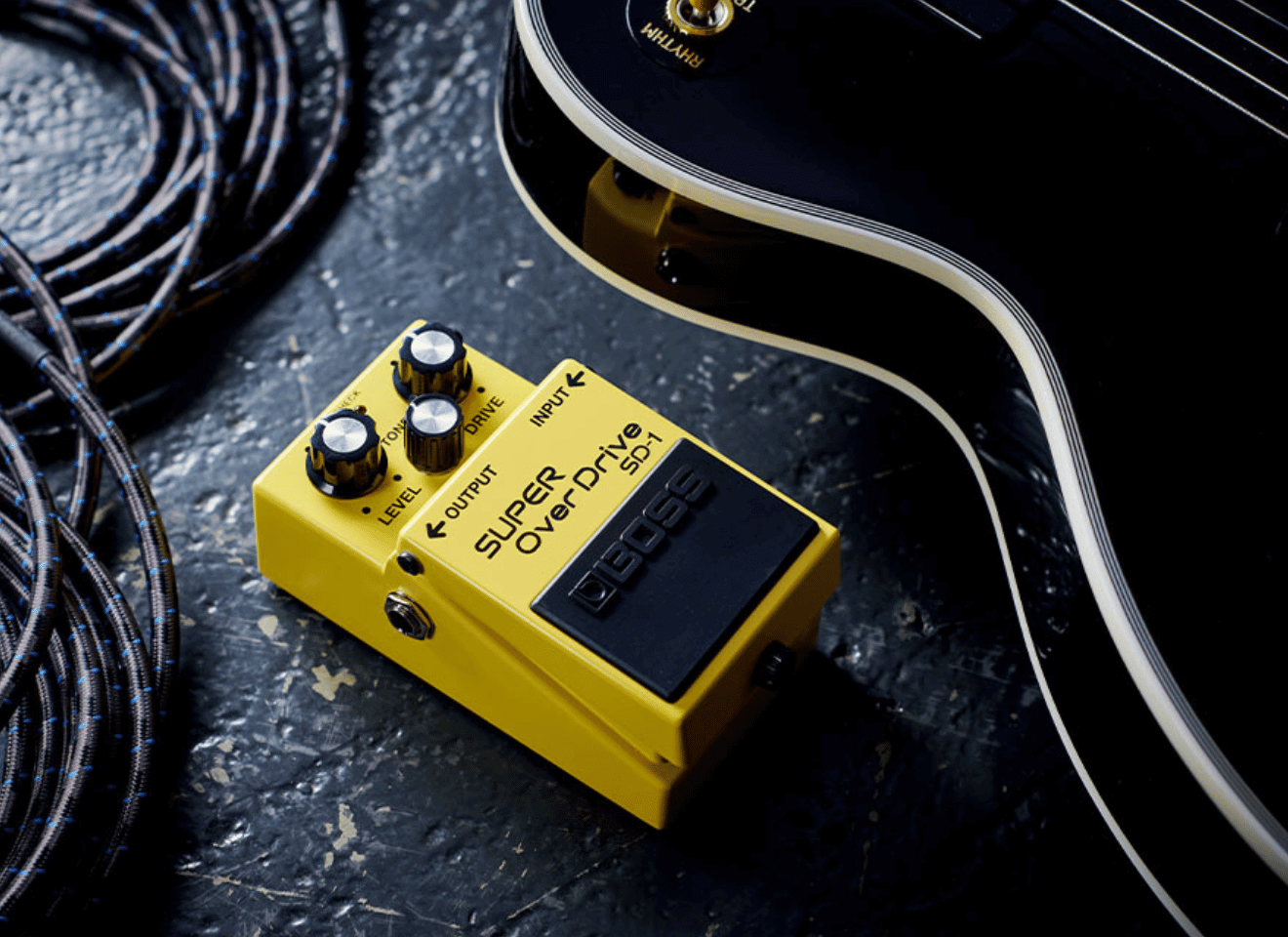Imagine this, you’re grooving to your favorite blues tune, fingers flying across the fretboard, but something’s not quite right.
Finding the best guitar strings for blues can greatly impact your tone, feel, and overall playing experience.
In this article, we’ll guide you through the ins and outs of blues guitar strings, helping you find the perfect set to bring your music to life.
Whether you’re a fresh-faced beginner or a seasoned blues veteran, the right strings can take your playing to a new level.
Together, we’ll uncover the ideal types of strings, materials, and gauges to suit the unique needs of blues guitarists.
Aside from that, I’ll also answer some of the most frequently asked questions on this topic so that you can have a better idea of what to look for when making a purchase.
Table of Contents
- Best Guitar Strings For Blues
- Ernie Ball Earthwood Rock & Blues Phosphor Bronze Strings
- D’Addario Guitar Strings Nickel Bronze
- Ernie Ball Earthwood Rock & Blues Bronze Strings
- Elixir Strings 19052 Coated Nickel Electric Guitar Strings
- Ernie Ball Super Slinky Nickel Wound Strings
- Ernie Ball Power Slinky Nickel Wound Electric Guitar Strings
- Dean Markley Blue Steel Electric Guitar Strings
- D’Addario XL Chromes Electric Guitar Strings
- Rotosound RH10 Nickel Light Top Heavy Bottom Strings
- Ernie Ball Regular Slinky Classic Pure Nickel Electric Guitar Strings
- GHS Strings GB-DGF David Gilmour Signature Series Strings
- Dunlop DEN1046 Medium Nickel Wound Electric Guitar Strings
- D’Addario Blues/Jazz Rock Nickel Wound Electric Guitar Strings
- D’Addario XT Nickel Coated Electric Guitar Strings
- DR Strings Pure Blues Pure Nickel Wrap Round Core
- Ernie Ball Regular Slinky Nickel Wound Electric Guitar
- D’Addario XL Pure Nickel Electric Guitar Strings
- What to consider before buying guitar strings for blues?
- How does string gauge affect your blues playing and tone?
- Are there any string materials that work best for blues?
- Which are the most popular guitar string brands?
- What’s the difference between coated and uncoated strings?
- What’s the average lifespan of guitar strings?
- Do light guitar strings break more easily?
- Should you change all guitar strings or just the broken/bad ones?
Best Guitar Strings For Blues
Before I begin, here are my top selected choices:
Dean Markley Blue Steel Electric Guitar Strings

Cryogenically-frozen Blue Steel strings for true tone and maximum longevity. Check Price
|
|
Ernie Ball Earthwood Rock & Blues Phosphor Bronze Strings

Delivers warm, rich tones and are favored by top musicians. Check Price
|
Ernie Ball Earthwood Rock & Blues Phosphor Bronze Strings
Delivers warm, rich tones and are favored by top musicians.
Ernie Ball Earthwood Phosphor Bronze guitar strings provide a warm, rich sound with excellent clarity, featuring precision wound phosphor bronze wrap wire and a brass-plated high-carbon steel hex core wire. Perfect for Paul McCartney, John Mayer, Brad Paisley, and Billie Joe Armstrong.
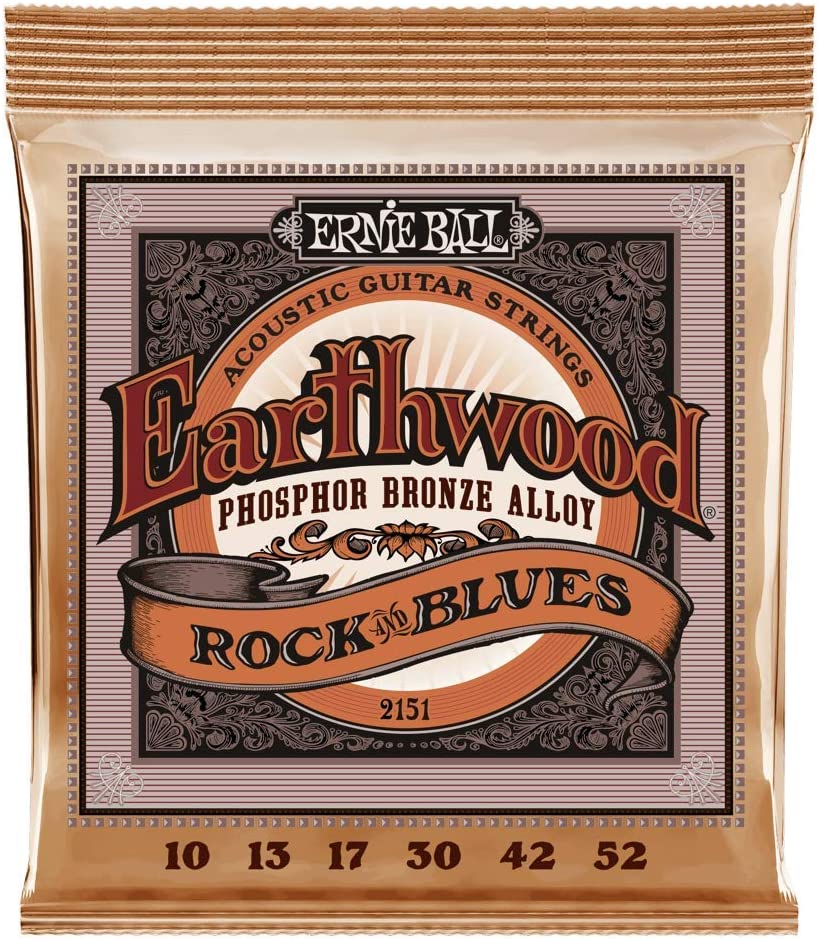
Let me tell you about these Ernie Ball Earthwood Rock and Blues Phosphor Bronze Acoustic Guitar Strings that I came across recently.
They’re specifically made for acoustic guitars and have a gauge that varies from 10 to 52.
What’s cool about these strings is that they’re manufactured in California, using top-notch materials to ensure great sound quality and durability.
The composition of these strings is quite interesting – they’re made with phosphor bronze wire wrapped around a hex-shaped, high-carbon steel core wire.
This combination gives them that warm, rich tone with excellent projection and clarity.
As a result, they’re versatile and suitable for a wide range of music genres.
One unique aspect of these strings is the unwound G-string, similar to what you’d find in most electric guitar string sets.
This design choice makes playing lead guitar on an acoustic instrument easier, which is pretty cool!
The strings are made from 92% copper, 7.7% tin, and 0.5% phosphorus, giving them a distinct sound and adding to their longevity.
To further extend their lifespan, they come in Element Shield Packaging that helps keep them fresh and ready to use.
You can find these strings in various gauges to match your playing style, and you’ll be in good company too!
Many famous musicians, like Paul McCartney, John Mayer, and Brad Paisley, are known to use these strings.
- My Review
I recently had the opportunity to try out the Ernie Ball Earthwood Rock and Blues Phosphor Bronze Acoustic Guitar Strings, and I must say, they’ve left quite an impression on me.
These strings, specifically designed for acoustic guitars, have a gauge range of 10 to 52, which offers a versatile playing experience.
One of the first things I noticed about these strings was their composition.
Made with phosphor bronze wire wrapped around a hex-shaped, high-carbon steel core wire, they produce a warm, rich tone that enhances my guitar’s overall sound.
In addition, their projection and clarity made them suitable for various music genres, from rock to folk and blues.
A unique aspect of these strings is the unwound G-string, similar to what you find in most electric guitar string sets.
This design choice made it easier for me to play the lead guitar on my acoustic instrument, something I genuinely appreciated.
In addition, the 92% copper, 7.7% tin, and 0.5% phosphorus blend contribute to their distinct sound and durability.
While the Element Shield Packaging is a nice touch to help prolong the life of the strings and keep them fresh, I did notice that they seemed to corrode more quickly than some other strings I’ve used in the past.
However, this didn’t significantly affect their performance when I used them.
In terms of playability, I found these strings to be quite comfortable on my fingers, making them ideal for extended practice sessions or performances.
Although the high E string did break during the stringing process, the rest of the strings held up well and provided a great playing experience.
Here are the ratings I’ll give to the Ernie Ball Earthwood Rock & Blues Acoustic Guitar Strings:
In my experience using the Ernie Ball Earthwood Rock and Blues Phosphor Bronze Acoustic Guitar Strings, I found them a reliable and versatile option for anyone looking to enhance their acoustic guitar’s sound and playability.
While they may have minor drawbacks, such as the tendency to corrode faster than other strings, their overall performance and unique features make them worth considering for novice and experienced guitarists.
- Pros:
- Warm, rich tone.
- Unwound G-string for lead playing.
- Durable material composition.
- Cons:
- Corrodes faster than some strings.
- High E string may break during stringing.
- Slightly tinnier sound for some players.
My final verdict is that the Ernie Ball Earthwood Rock and Blues Phosphor Bronze Acoustic Guitar Strings are a solid choice for guitarists seeking a warm and rich tone, along with the unique unwound G-string feature.
While they may have minor drawbacks regarding durability and intonation, their overall performance and material quality make them worthwhile for novice and experienced players.
D’Addario Guitar Strings Nickel Bronze
Nickel Bronze strings for natural, clear and focused tone.
Nickel Bronze acoustic strings offer balanced clarity, resonance and projection to reveal the natural sound of your guitar. Featuring a NY Steel core and nickel-plated phosphor bronze wrap, these 11-52 Custom Light gauge strings deliver increased mid and high range frequencies for a harmonically rich tone.
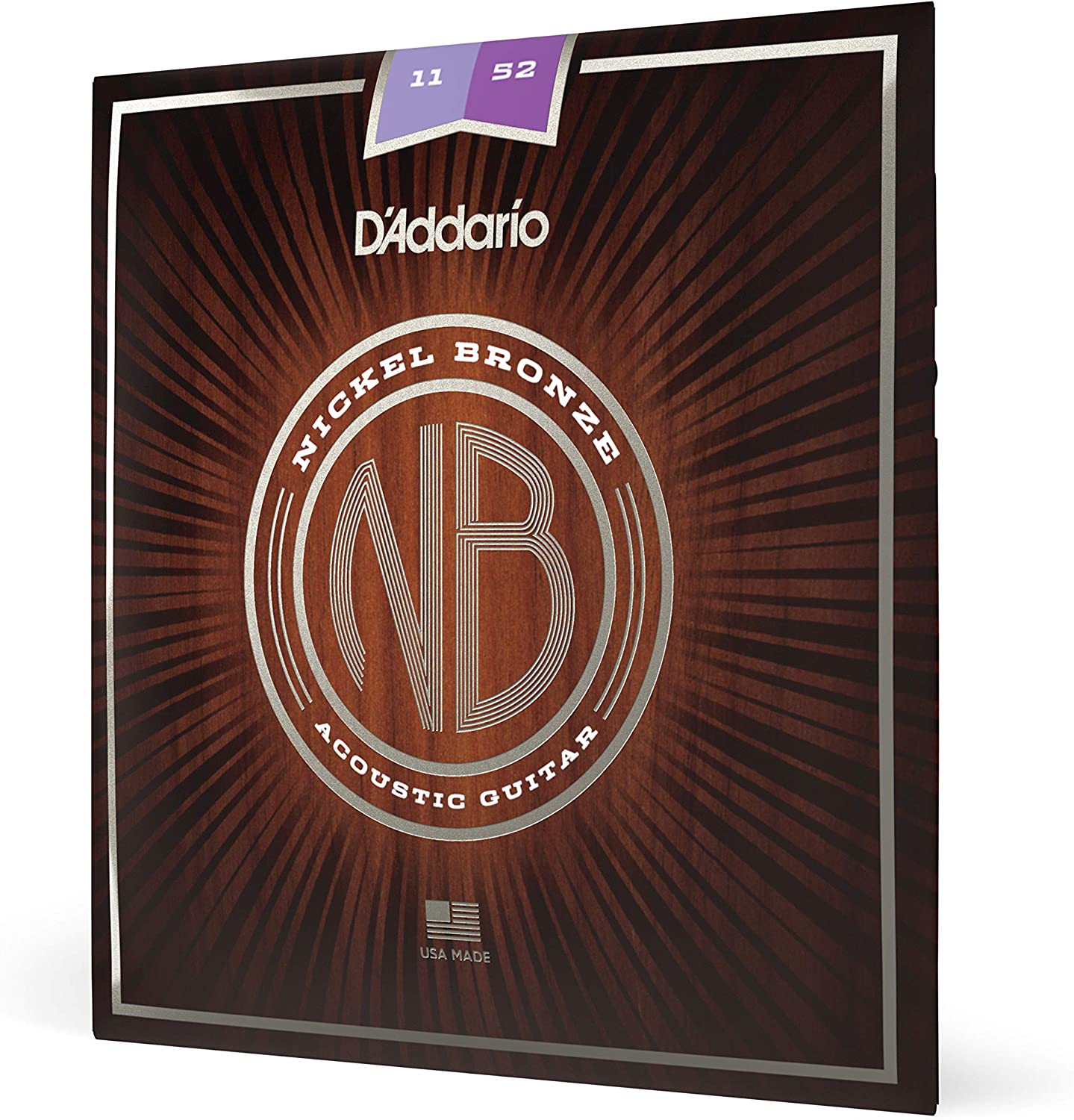
D’Addario’s Nickel Bronze Acoustic Guitar Strings are tailored to let your guitar’s natural voice shine through.
These strings boast a unique alloy made from nickel-plated phosphor bronze wrapped around a high-carbon NY steel core.
This special combination enhances the depth and warmth of traditional phosphor bronze while boosting mid and high frequencies for greater clarity, projection, and rich overtones.
These custom light gauge strings (11-52) offer more volume and projection than extra light strings while still being easy to play.
In addition, nickel Bronze strings are designed to suit the tonal characteristics of your guitar, magnifying the instrument’s wood properties.
As an added advantage, these strings come with corrosion-resistant nickel plating, ensuring they last longer without needing replacement.
Plus, they’re proudly made in D’Addario’s New York production facility, guaranteeing top-notch quality.
And when you purchase these strings, you can also earn Players Circle reward points by registering the code on the recyclable VCI bag.
- My Review
I recently tried the D’Addario Nickel Bronze Acoustic Guitar Strings, and I must say, they have some great features.
Made with a nickel-plated phosphor bronze wrapped around a high-carbon NY steel core, these strings are designed to let my guitar’s natural voice shine through.
They enhanced the depth and warmth of the traditional phosphor bronze sound while boosting mid and high frequencies for greater clarity, projection, and rich overtones.
As a custom light gauge (11-52), I discovered that these strings offered more volume and projection than extra light strings while still being easy to play.
In addition, the corrosion-resistant nickel plating was a nice touch, ensuring the strings last longer without needing a replacement.
I also appreciated that they were made in D’Addario’s New York production facility, guaranteeing top-notch quality.
However, after testing these strings on my guitar, I did notice some areas for improvement.
While I initially enjoyed their bright, clear sound, their tone faded after a couple of weeks of playing.
Additionally, I encountered some issues with durability, as a couple of strings snapped during the tuning process.
Another aspect I noticed was that the strings felt stiff compared to other brands I’ve tried.
Again, this might not be an issue for everyone, but it’s worth noting if you’re particular about the feel of your guitar strings.
Despite these drawbacks, the D’Addario Nickel Bronze Acoustic Guitar Strings have some fantastic features worth trying.
Here are the ratings I’ll give to the D’Addario Guitar Strings Nickel Bronze:
They offer a unique sound, increased corrosion resistance, and are made in the USA.
Just be prepared for some potential durability and stiffness issues, and test them on your specific guitar to find the best fit for your playing style and instrument.
- Pros:
- Enhances guitar’s natural voice.
- Increased corrosion resistance.
- Made in the USA.
- Cons:
- Tone may fade over time.
- Potential durability issues.
- Strings can feel stiff.
My final verdict is that the D’Addario Nickel Bronze Acoustic Guitar Strings offer unique sound and quality materials but may require some compromise on durability and stiffness.
The strings are worth trying for their enhanced natural voice and corrosion resistance, but it’s essential to test them on your specific guitar to determine if they’re the best fit for your playing style and instrument.
Ernie Ball Earthwood Rock & Blues Bronze Strings
Bright, balanced sound and optimal lead playing.
Ernie Ball Earthwood 80/20 Bronze acoustic strings provide bright, balanced sound with pleasing overtones, making them ideal for lead playing. They come with plain G-string, are available in multiple gauges, and feature lock twists and 80/20 bronze wrap wire for durability.
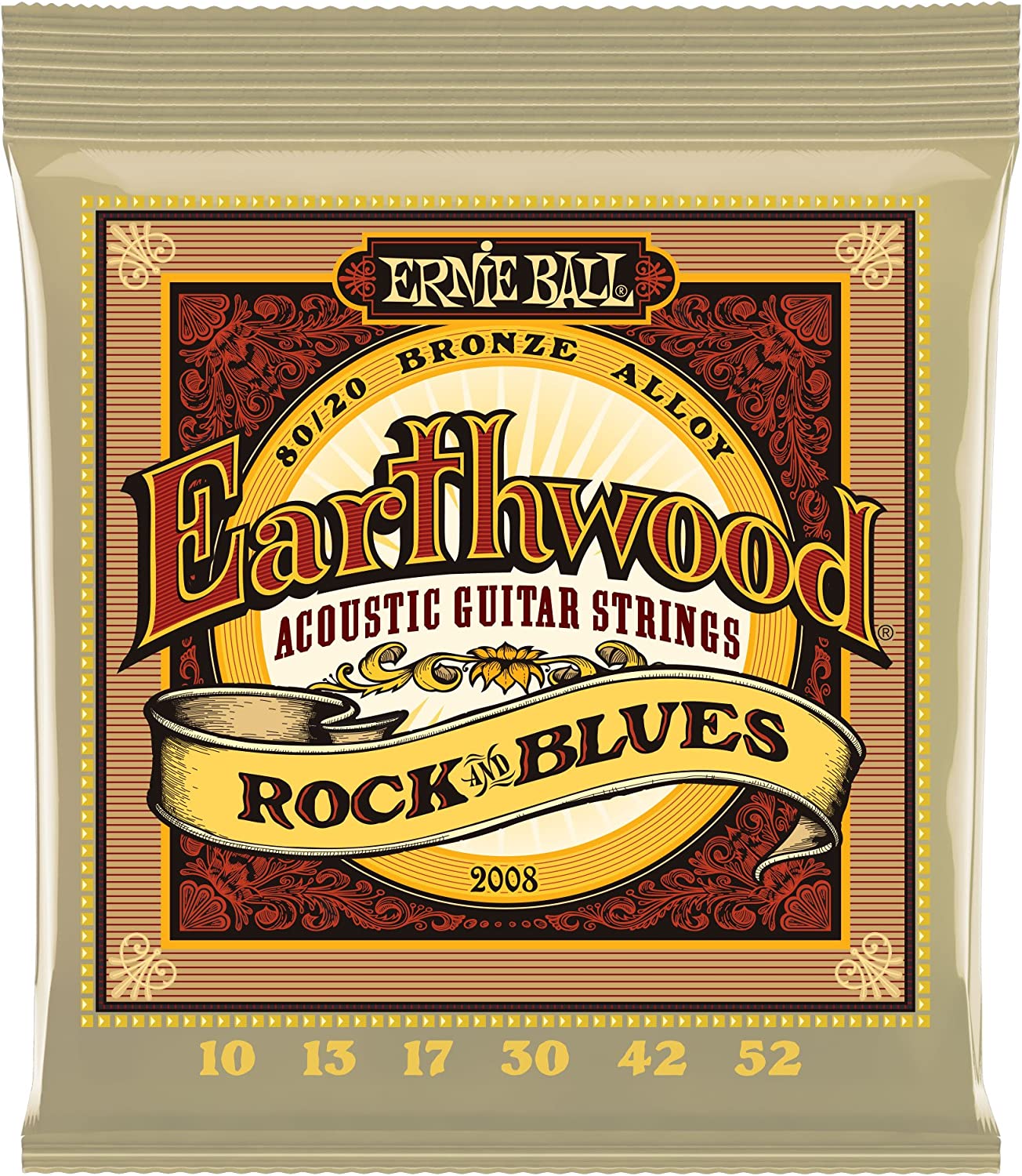
Ernie Ball Earthwood Rock and Blues Acoustic Guitar Strings are designed with a unique 80/20 bronze composition, providing a vibrant tone and amazing clarity for your acoustic guitar.
These strings are made in California using the finest materials and are specifically crafted to optimize lead playing on acoustic guitars.
With a gauge of 10-52, the set includes a plain G-string, which is similar to most electric string sets.
These strings are wound with 80% copper and 20% zinc wire around a high-carbon steel core wire, ensuring long-lasting and reliable performance.
In addition, the Element Shield Packaging helps prolong the life of the strings, keeping them fresh and ready for use whenever you need them.
Ideal for musicians seeking a bright, balanced tone, the Ernie Ball Earthwood Rock and Blues Acoustic Guitar Strings offer excellent projection and a crisp sound.
- My Review
I recently tried out the Ernie Ball Earthwood Rock and Blues Acoustic Guitar Strings, and I have to say, they impressed me.
These strings have a unique 80/20 bronze composition, giving them a bright, balanced tone that I love.
In addition, the high-carbon steel core wire adds durability, and the 10-52 gauge set, including a plain G-string, makes this set perfect for playing leads on acoustic guitar.
As soon as I put them on my guitar, I noticed a significant improvement in the sound quality.
The strings provided excellent projection and clarity, making my guitar sound better.
I also appreciated the Element Shield Packaging, which helped keep the strings fresh and ready to use.
I enjoyed the ease of restringing my guitar with these strings.
They were simple to install and felt smooth to the touch.
However, I did notice that the sound was a bit brighter than I’m used to, which might not be everyone’s cup of tea.
I didn’t mind, but it’s something to consider if you prefer a warmer or darker tone.
Regarding durability, I didn’t experience any issues with the strings breaking or losing sound prematurely.
They held their tuning well and maintained their crisp tone throughout my playing sessions.
However, I did notice that they felt a bit different from other brands I’ve used in the past, which might take some getting used to for some players.
Despite these minor drawbacks, I believe the Ernie Ball Earthwood Rock and Blues Acoustic Guitar Strings are a fantastic choice for anyone looking to enhance their acoustic guitar’s sound and playability.
Here are the ratings I’ll give to the Ernie Ball Earthwood Rock and Blues Acoustic Guitar Strings:
The strings offer a unique tonal quality and are made with top-notch materials, making them a solid investment for any musician.
So, if you’re in the market for a new set of acoustic guitar strings, I highly recommend giving these a try.
- Pros:
- Bright, balanced tone.
- Durable high-carbon steel core.
- Easy restringing process.
- Cons:
- Sound may be too bright for some.
- Feels different from other brands.
- Not ideal for darker tones.
My final verdict is that the Ernie Ball Earthwood Rock and Blues Acoustic Guitar Strings are great for musicians seeking a bright, balanced tone and enhanced playability.
Despite minor drawbacks, their durability and quality make them a worthy investment for any guitarist.
Elixir Strings 19052 Coated Nickel Electric Guitar Strings
Long-lasting, corrosion-resistant tone with reliable performance.
Elixir Strings offer a long-lasting, great-sounding tone with corrosion resistance and greater tuning stability for acoustic and electric instruments. They are designed to withstand wildly fluctuating temperatures and humidity for reliable performance.
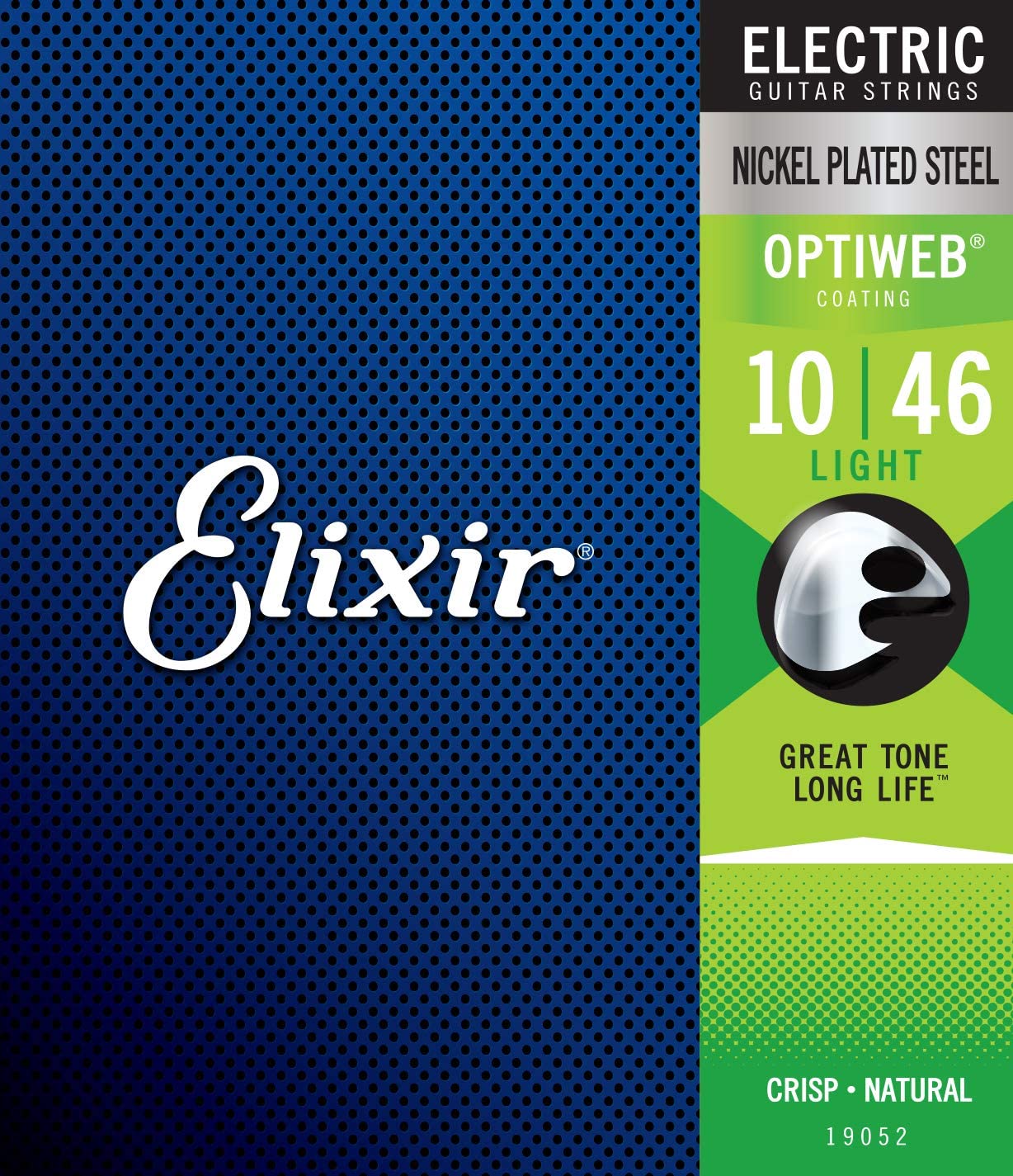
Elixir’s 19052 Coated Nickel Electric Guitar Strings offer a light gauge (.010-.046) set of strings perfect for electric guitar players.
These strings are made using a nickel-plated steel wrap wire, ensuring their durability and longevity.
In addition, the unique OPTIWEB coating on the strings gives them a natural feel comparable to playing on uncoated strings.
This coating technology also helps prevent common corrosion and debris buildup, prolonging the tone life of the strings even further than other coated or uncoated options.
Constructed with the needs of electric guitar players, this set of strings from Elixir offers a crisp and clear tone that remains consistent throughout its lifespan.
The anti-rust plating on the plain steel strings adds an extra layer of protection, ensuring an even longer-lasting tone for the entire set.
These strings have been designed to cater to various musical styles and preferences, providing reliable performance in any playing environment, whether live gigs, studio sessions, or casual jamming at home.
- My Review
Having tried the Elixir 19052 Coated Nickel Electric Guitar Strings, I can confidently share my experience with these light gauge (.010-.046) strings.
One of the major benefits of these strings is their durable nickel-plated steel wrap wire construction, which has provided a longer-lasting string and maintained a consistent tone throughout my playing sessions.
The unique OPTIWEB coating on these strings felt natural to play, and I didn’t notice any significant difference in feel compared to uncoated strings.
This coating technology has also been effective in preventing corrosion and debris buildup, extending the tone life of the strings.
In addition, I’ve noticed that the anti-rust plating on the plain steel strings has contributed to an even longer-lasting tone for the entire set.
While using these strings, I enjoyed their crisp and clear tone, catering to various musical styles and preferences.
However, I did notice that the coating tends to fray after some time, resulting in a slightly sharp feel on the strings.
This might not be a significant issue for all players, but it’s something to remember when considering these strings.
In terms of tuning stability, the Elixir 19052 strings held their tune remarkably well, even after extended playing sessions.
This reduced the need for constant retuning, allowing me to focus more on my playing.
However, despite providing reliable performance in various playing environments, I did find that the strings sounded a bit “thick” and muddy during some distorted chords.
Depending on the guitar and playing style, this might not be an issue for everyone, but it’s worth noting.
Here are the ratings I’ll give to the Elixir Strings 19052 Coated Nickel Electric Guitar Strings:
In my experience with these strings, they cater well to electric guitar players looking for a durable, long-lasting string set with a natural feel and consistent tone.
While there are some minor drawbacks, such as the fraying coating and somewhat thick sound during distorted chords, the overall performance of the Elixir 19052 Coated Nickel Electric Guitar Strings has been impressive.
- Pros:
- Durable nickel-plated steel construction.
- Natural feel with OPTIWEB coating.
- Excellent tuning stability.
- Cons:
- Coating may fray over time.
- Thick sound during distorted chords.
- Potential for uneven intonation.
My final verdict is that the Elixir 19052 Coated Nickel Electric Guitar Strings are a reliable and durable option for electric guitar players seeking a long-lasting string set with a natural feel and consistent tone.
While there are minor drawbacks, such as the fraying coating and somewhat thick sound during distorted chords, these strings’ overall performance and quality make them a solid choice for most players.
Ernie Ball Super Slinky Nickel Wound Strings
Legendary tone with Ernie Ball Super Slinky Nickel Wound Electric Guitar Strings.
Ernie Ball Slinky electric guitar strings deliver iconic and balanced tone, precision winding, and solid construction. Proven favorites of legendary artists, Slinky strings come in a variety of gauges to suit all playing styles.
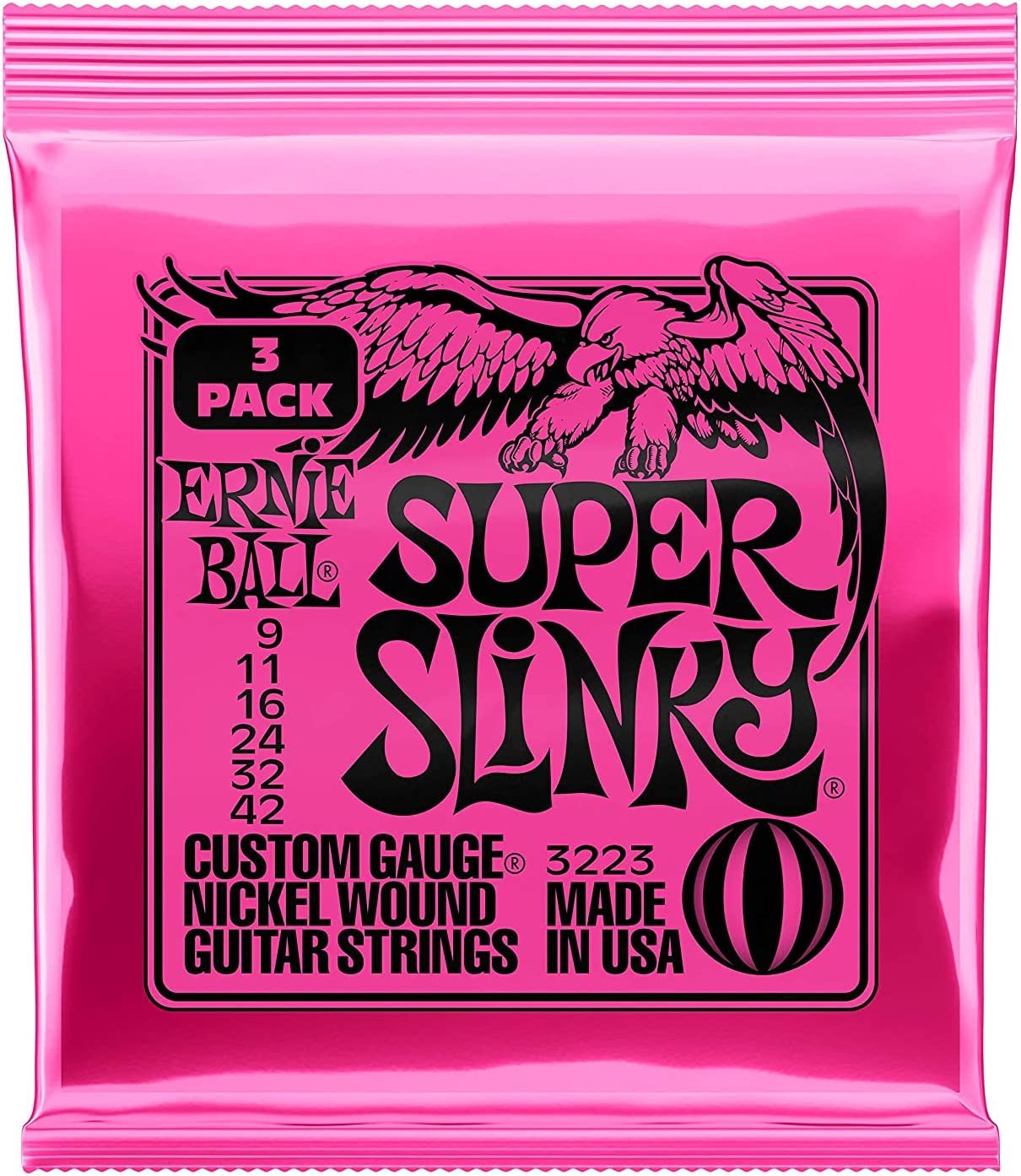
Ernie Ball Super Slinky Nickel Wound Electric Guitar Strings are three sets of strings catering to musicians who appreciate quality and affordability.
These strings have been a popular choice among guitarists for decades, with legends like Slash, Jimmy Page, Metallica, and Eric Clapton having used them.
In this 9-42 gauge set, the strings are crafted from nickel-plated steel and wrapped around a tin-plated high-carbon steel core.
This combination produces a bright, balanced tone that complements various guitar types and playing styles.
The strings also come in Element Shield Packaging to ensure they remain fresh and prolong their lifespan.
As one of the original Slinky gauges, the Super Slinky set maintains its popularity due to its reliable performance and durability.
The brand, Ernie Ball, has been a leading manufacturer of guitar strings and accessories since 1962 and continues to innovate with the latest technologies and finest materials to enhance the musician’s experience.
- My Review
After trying out the Ernie Ball Super Slinky Nickel Wound Electric Guitar Strings for myself, I have to say that I’m quite impressed with their overall performance.
One of the first things I noticed is their bright and balanced tone, which complements a variety of guitar types and playing styles.
From my experience with different string brands, Ernie Ball’s Super Slinky set offers a unique and pleasing sound that stands out.
The 9-42 gauge strings are made from nickel-plated steel wrapped around a tin-plated high-carbon steel core, giving them a durable build and consistent performance.
They hold their tuning well, even after a few days of sitting unused.
But, of course, if I played every day, I didn’t need to retune them as often.
The Element Shield Packaging is a nice touch, ensuring the strings stay fresh and well-protected from when they’re manufactured until the moment they’re installed on my guitar.
Knowing I’m getting a quality product that will last a long time is reassuring.
However, I did notice a few minor drawbacks.
While the strings are generally durable, I found that they can break under certain circumstances, such as when playing with heavy hands or using a lot of bends.
Additionally, some users might find the strings’ brightness too much for their personal preference, especially if they’re used to a warmer or darker tone.
Despite these minor issues, I believe that the Ernie Ball Super Slinky Nickel Wound Electric Guitar Strings offer excellent sound quality, durability, and value for money.
They work well for various genres and playing styles, making them versatile for any musician.
Plus, knowing they’re used by legendary artists like Slash, Jimmy Page, and Eric Clapton adds credibility and trust to the product.
Here are the ratings I’ll give to the Ernie Ball Super Slinky Nickel Wound Electric Guitar Strings:
In my experience, the benefits far outweigh the drawbacks.
I recommend these strings to anyone looking for a quality set with a bright, balanced tone and reliable performance.
- Pros:
- Bright, balanced tone quality.
- Durable and long-lasting.
- Trusted by legendary musicians.
- Cons:
- Potential for occasional breakage.
- Tone may be too bright for some.
- Requires retuning after heavy use.
My final verdict is that the Ernie Ball Super Slinky Nickel Wound Electric Guitar Strings are an excellent choice for musicians seeking a bright, balanced tone and durable performance.
With a solid combination of quality materials and a trusted reputation, these strings will undoubtedly enhance your playing experience.
Ernie Ball Power Slinky Nickel Wound Electric Guitar Strings
Legendary artist-approved Ernie Ball strings for balanced tone and optimal performance.
Ernie Ball’s Power Slinky strings are perfect for rock and blues players seeking a thicker sound, favored by Slash, Metallica, and Kenny Wayne Shepherd. Nickel-plated steel wound strings and specially tempered tin-plated steel plain strings create balanced tone and smooth feel, with easy installation and long life.
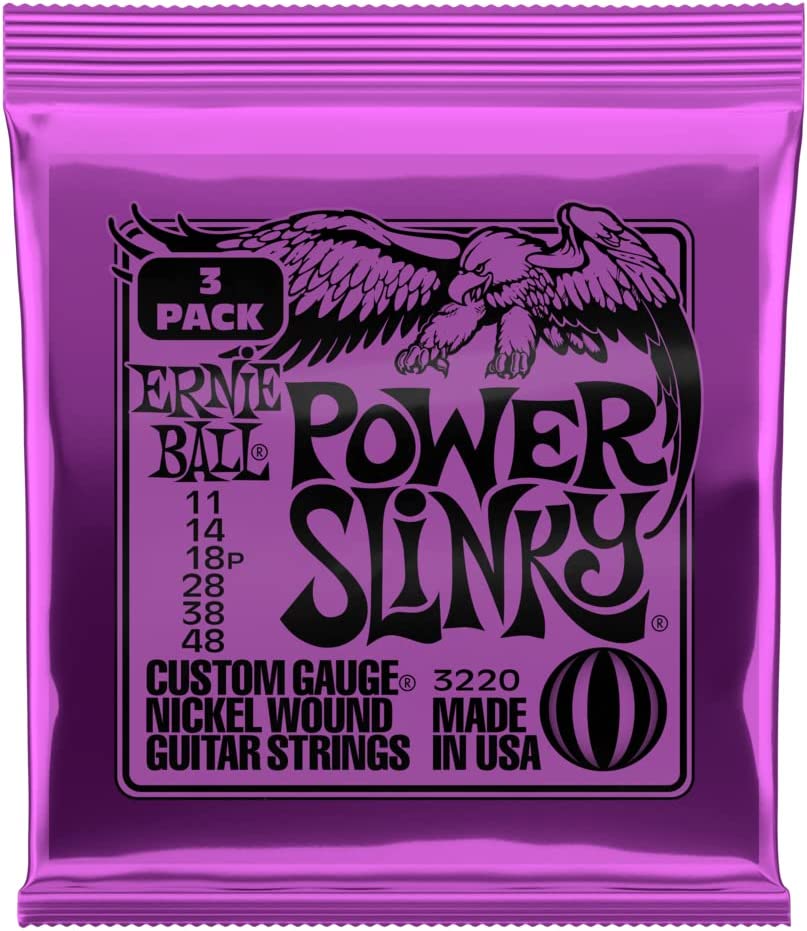
Ernie Ball Power Slinky Nickel Wound Electric Guitar Strings come in a 3-pack set with a gauge of 11-48, making them an ideal option for guitarists who enjoy playing rock and roll or blues.
Each set in this package is individually wrapped to ensure freshness and longevity.
Likewise, the strings are designed with the brand’s original 11-gauge Slinky set, offering a thicker string than standard 10-gauge sets.
This provides a powerful tone that many guitarists appreciate.
These electric guitar strings are manufactured precisely to the highest standards and exacting specifications, ensuring consistent performance and long life.
The wound strings are made from nickel-plated steel wire wrapped around a hex-shaped steel core wire, while the plain strings are made of specially tempered tin-plated high-carbon steel.
This results in a bright, balanced tone suitable for various musical genres.
Furthermore, the element shield packaging used for these strings helps prolong their life, ensuring they remain fresh and ready for use whenever needed.
- My Review
I recently had the opportunity to try out the Ernie Ball Power Slinky Nickel Wound Electric Guitar Strings in a 3-pack set, and I must say that they genuinely impressed me with their performance.
As someone who enjoys playing rock and roll and blues, the 11-48 gauge provided a powerful tone that I believe many guitarists can appreciate.
Upon first use, I noticed how bright and balanced the tone was, thanks to the materials used in their construction.
The wound strings are made from nickel-plated steel wire wrapped around a hex-shaped steel core wire, while the plain strings consist of specially tempered tin-plated high-carbon steel.
This combination results in a versatile sound that complements various playing styles.
One aspect that stood out to me was the element shield packaging, which helps prolong the strings’ life and maintain their freshness.
I’ve used other brands that didn’t have this kind of packaging, and I could tell the difference in string quality and longevity.
The strings felt comfortable to play, and my fingers moved smoothly across the fretboard without any issues.
I also appreciated that they held their tuning quite well, requiring minimal adjustments during my playing sessions.
However, I noticed that the strings seemed prone to rusting or showing signs of wear after some time.
Therefore, it’s essential to properly care for them, such as wiping them down after use, to extend their lifespan.
Additionally, while the tone was bright and balanced, some guitarists might prefer a slightly different sound, depending on their preferred genre or style.
Here are the ratings I’ll give to the Ernie Ball Power Slinky Nickel Wound Electric Guitar Strings:
In my experience, the Ernie Ball Power Slinky Nickel Wound Electric Guitar Strings are a reliable option for guitarists who appreciate a thicker gauge and a powerful tone.
They may not be perfect for everyone, but their quality construction and versatile sound make them a worthwhile consideration.
- Pros:
- Powerful tone with 11-48 gauge.
- Element shield packaging for longevity.
- Versatile sound for various styles.
- Cons:
- Prone to rusting or wear.
- Tone may not suit all preferences.
- Requires proper care for durability.
My final verdict is that the Ernie Ball Power Slinky Nickel Wound Electric Guitar Strings provide a powerful tone, versatile sound, and decent durability for guitarists who appreciate a thicker gauge.
However, they require proper care and maintenance to maximize their lifespan and performance.
Overall, they’re a solid choice for various playing styles and genres.
Dean Markley Blue Steel Electric Guitar Strings
Cryogenically-frozen Blue Steel strings for true tone and maximum longevity.
Dean Markley’s Blue Steel strings are cryogenically frozen for improved tone and longer life. These 8% nickel-plated steel strings provide consistent sound with true tones, and are great for professionals or beginners alike.
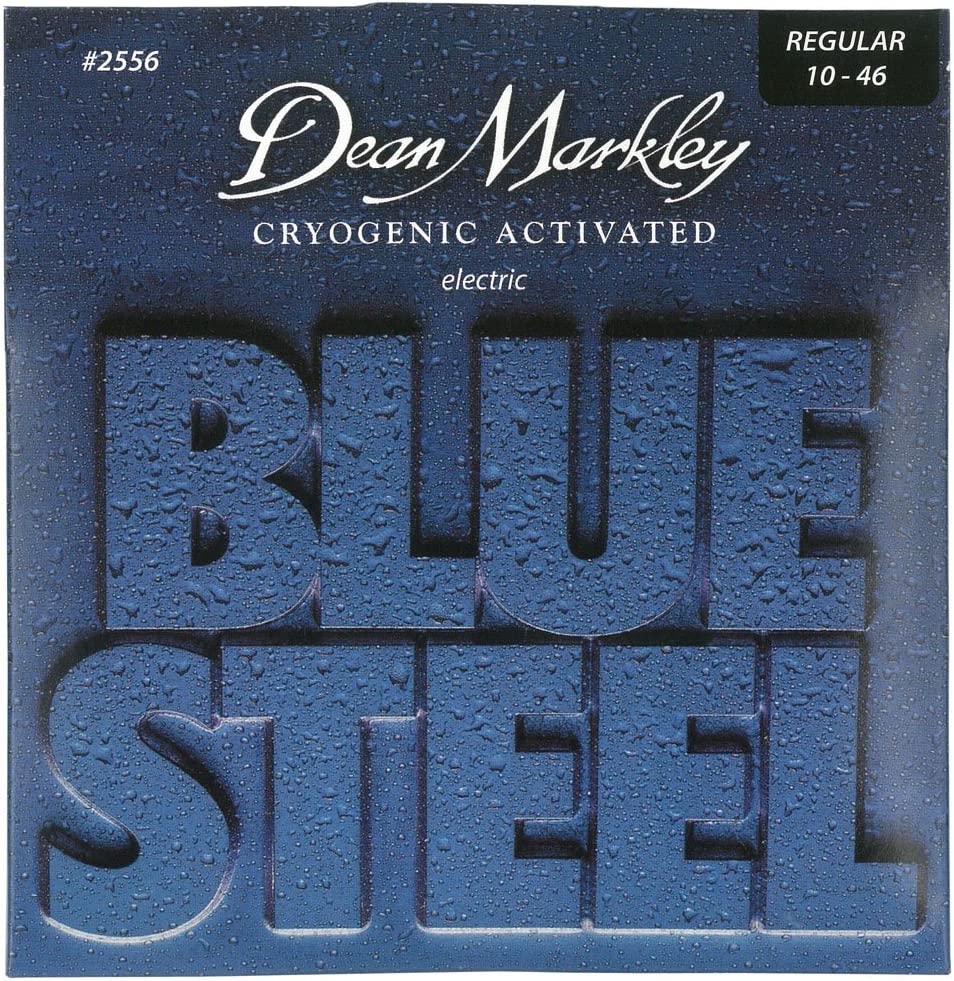
Dean Markley’s Blue Steel Electric Guitar Strings are designed with precision and innovation, offering guitarists exceptional performance and durability.
These medium gauge strings (.010-.046) are perfect for electric guitars and are crafted from steel, ensuring a long-lasting, high-quality sound.
Their unique cryogenic freezing process sets these strings apart, exposing them to temperatures as low as -320 degrees Fahrenheit.
This treatment tightens the molecular structure of the strings, reducing gaps and eliminating harsh highs and muddy lows.
The result is a consistent and true tone that lasts longer than regular strings.
Constructed from 8% nickel-plated steel outer wrap on tinned Mandolin wire hex-core, these strings have been popular among professionals for years.
The Blue Steel strings boast a remarkable combination of durability, longevity, and exceptional sound quality.
With Dean Markley’s commitment to excellence and their innovative cryogenic treatment, the Blue Steel Electric Guitar Strings offer guitarists a top-notch product that delivers great sound and stands up to the test of time.
- My Review
I’ve been playing with Dean Markley Blue Steel Electric Guitar Strings for a while now, and honestly, they’ve got a pretty awesome mix of durability, long life, and fantastic sound.
They’re medium gauge, so they work well for different styles of electric guitars, and the steel construction means they last quite a long time.
The cool thing about these strings is the cryogenic freezing process they go through.
It makes the strings more consistent and eliminates those harsh highs and muddy lows that can be problematic with other strings.
In addition, the nickel-plated steel outer wrap and the tinned Mandolin wire hex-core add to their toughness, which is probably why many pros love them.
When I started playing these strings, I noticed they felt smooth and comfortable under my fingers.
The sound was just right – a good balance of warmth and brightness.
But I’ve got to say; they needed some stretching before they stayed in tune properly.
As for how long they last, the Blue Steel strings outlive most other brands I’ve tried.
I mean, some people might see a bit of corrosion after a few weeks, but if you take good care of them, they keep their bright and full sound for a long time.
The one downside I encountered was that these strings seemed more likely to break during installation.
I’d say just be extra careful when stretching and tuning them the first time to avoid that issue.
Here are the ratings I’ll give to the Dean Markley Blue Steel Electric Guitar Strings:
So, all in all, I think the Dean Markley Blue Steel Electric Guitar Strings are a solid choice if you’re after great sound and durability.
They’ve got a couple of minor downsides, but that unique cryogenic treatment and top-notch materials make them well worth a try for any guitarist who’s serious about their sound.
- Pros:
- Smooth feel and comfortable play.
- Long-lasting with consistent tone.
- Unique cryogenic treatment.
- Cons:
- Requires initial stretching for tuning.
- Prone to breaking during installation.
- Minor corrosion possible over time.
My final verdict is that the Dean Markley Blue Steel Electric Guitar Strings are a reliable and high-quality option for guitarists seeking a balance of durability, longevity, and impressive sound.
Despite minor drawbacks, their unique cryogenic treatment and superior materials make them a worthwhile investment for musicians who value performance and consistency.
D’Addario XL Chromes Electric Guitar Strings
Flat wound, warm, mellow tone with Players Circle rewards.
D’Addario XL Chromes are the industry-standard flatwound strings, delivering a smooth feel and warm, mellow tone. Their Hex Core construction and precision-drawn wire provide stability and unparalleled sound quality. Popular among jazz, blues, and rockabilly guitarists, they are renowned for their reliability and crafted with proprietary winding technology. Join Players Circle for exclusive access and rewards.
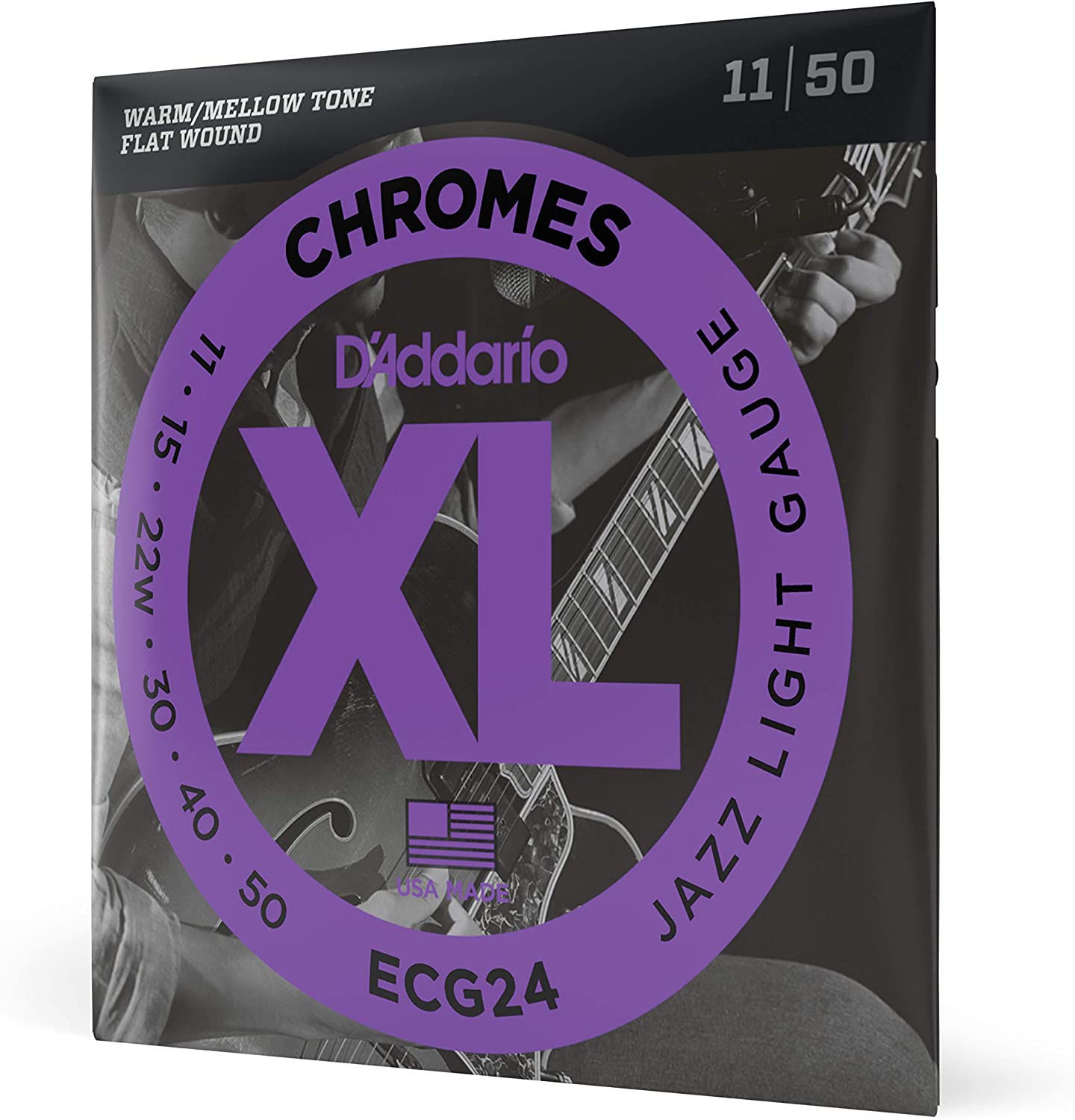
D’Addario’s XL Chromes Electric Guitar Strings are a unique set of strings designed to offer guitarists a distinctively warm and mellow sound.
These flat-wound strings are crafted precisely to deliver an ultra-smooth playing experience, making them a popular choice for jazz and blues musicians.
One of the key features of these strings is their stainless steel flattened ribbon wrap wire, which is carefully polished to achieve unparalleled smoothness.
This results in a warm, rich tone for those seeking a more vintage sound.
Another notable aspect of these strings is their hex-core construction.
This innovative design, pioneered by D’Addario, allows the wrap wire to grip the core securely, ensuring a consistent feel, reliable intonation, and lasting durability.
These strings are available in various gauges and finishes, allowing you to find the perfect set for your instrument and playing style.
Additionally, the D’Addario brand is well-known for its high-quality, American-made products, so you can trust that these strings are crafted to the highest standards.
- My Review
D’Addario’s XL Chromes Electric Guitar Strings are a unique set of strings designed to offer guitarists a distinctively warm and mellow sound.
These flat-wound strings are crafted precisely to deliver an ultra-smooth playing experience, making them a popular choice for jazz and blues musicians.
One of the key features of these strings is their stainless steel flattened ribbon wrap wire, which is carefully polished to achieve unparalleled smoothness.
This results in a warm, rich tone for those seeking a more vintage sound.
Another notable aspect of these strings is their hex-core construction.
This innovative design, pioneered by D’Addario, allows the wrap wire to grip the core securely, ensuring a consistent feel, reliable intonation, and lasting durability.
These strings are available in various gauges and finishes, allowing you to find the perfect set for your instrument and playing style.
Here are the ratings I’ll give to the D’Addario XL Chromes Electric Guitar Strings:
Additionally, the D’Addario brand is well-known for its high-quality, American-made products, so you can trust that these strings are crafted to the highest standards.
With their unique combination of warmth, smoothness, and durability, D’Addario XL Chromes Electric Guitar Strings are an excellent choice for those seeking to elevate their playing experience and achieve a distinctive, vintage tone.
- Pros:
- Warm, mellow tone.
- Ultra-smooth playing experience.
- Durable hex-core construction.
- Cons:
- Not suitable for all genres.
- Adjustment period for new users.
- Potential high tension concerns.
My final verdict is that the D’Addario XL Chromes Electric Guitar Strings are an excellent choice for guitarists seeking a warm, mellow tone and a smooth playing experience, particularly for those who enjoy jazz and blues music.
While they may not be suitable for all musical styles, their high-quality construction and unique sound make them a worthwhile option for those looking for a distinctive set of strings.
Rotosound RH10 Nickel Light Top Heavy Bottom Strings
Premium nickel strings for superior sound quality and tuning stability.
Rotosound Roto Blues Nickel on Steel electric guitar strings are made using a nickel alloy on steel core, wound with nickel plated steel to give a bright and balanced tone. Designed to fit all electric guitars, these strings are available in the following gauges: 10-13-17-30-42-52. Rotosound Roto Blues Nickel on Steel Electric Guitar Strings offer bright, balanced tone and tuning stability for electric guitars. Made with a nickel alloy on steel core and nickel-plated steel windings, these strings are ideal for any playing style and come in 10-13-17-30-42-52 gauges.
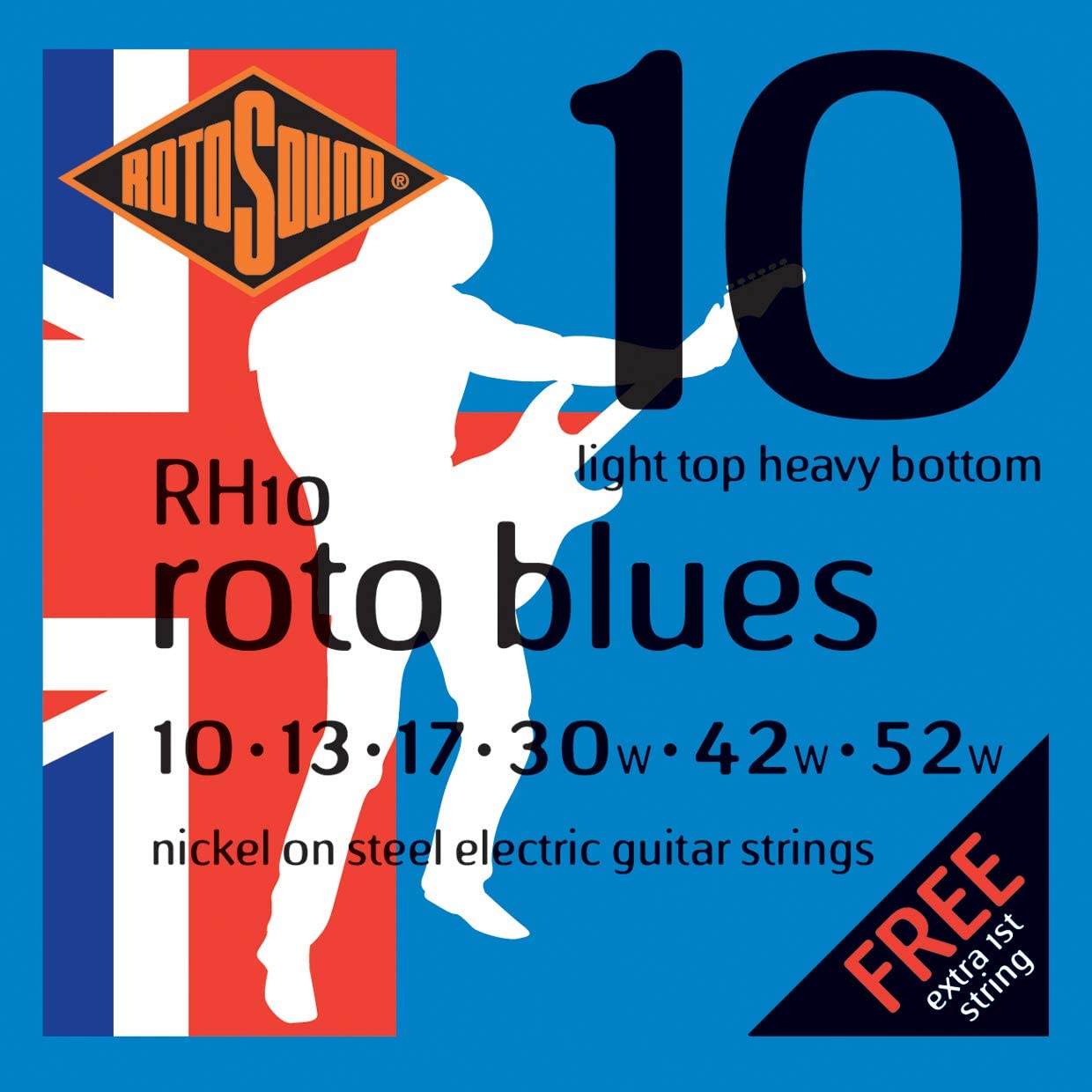
Let me introduce you to the Rotosound RH10 Nickel Light Top/Heavy Bottom Electric Guitar Strings, a premium set of strings exclusively crafted for electric guitars.
With gauges ranging from 10 to 52, these strings cater to various playing styles and suit the needs of today’s musicians.
Rotosound, a well-known British brand, has been manufacturing strings for over fifty years and is recognized for its legendary products like Swing Bass 66 and Roto strings.
These particular guitar strings are made from nickel and come in a custom gauge with a multicolor appearance.
They have been trusted by iconic musicians such as Jimi Hendrix, John Entwistle, and Geddy Lee to create their signature sounds.
Rotosound ensures that each string undergoes rigorous inspection throughout the manufacturing process for maximum consistency in tone, tuning stability, and durability, making them a favorite among artists worldwide.
The Rotosound Roto Blues Nickel on Steel Electric Guitar Strings are available for 6, 7, 8, and 12-string guitars, offering a wide range of options for musicians.
These strings are made from the highest quality materials and are perfect for guitarists seeking excellent sound and performance.
- My Review
After trying out the Rotosound RH10 Nickel Light Top/Heavy Bottom Electric Guitar Strings, I can confidently say they are a high-quality set of strings for electric guitar players.
In addition, the custom gauge, ranging from 10 to 52, offers a diverse selection of various playing styles, making them suitable for a wide range of musicians.
One of the first things I noticed about these strings was their exceptional tone and tuning stability.
They held their tuning well, even after hours of playing, and the nickel material provided a bright, clear sound that resonated beautifully with every note.
The durable construction of the strings also ensured that they could withstand prolonged use without losing their tonal quality.
When it comes to the Rotosound brand, its reputation for producing top-tier strings is evident in its attention to detail and commitment to quality.
The manufacturing process involves thorough inspection at every stage, resulting in a consistent product many guitarists, including myself, can appreciate.
Upon trying the Roto Blues Nickel on Steel Electric Guitar Strings, I found them versatile and suitable for 6, 7, 8, and 12-string guitars.
This wide range of options is a testament to Rotosound’s dedication to catering to the needs of various musicians.
However, it’s important to note that these strings may not be the perfect fit for everyone.
For example, some guitar players might find the nickel material not their liking or the string gauges might not suit their specific playing style.
Therefore, it’s essential to consider personal preferences and guitar setup when choosing a set of strings.
Here are the ratings I’ll give to the Rotosound RH10 Nickel Light Top/Heavy Bottom Electric Guitar Strings:
Despite these potential drawbacks, I found the Rotosound RH10 Nickel Light Top/Heavy Bottom Electric Guitar Strings a reliable, high-quality product that enhances my guitar’s overall sound and performance.
Therefore, I recommend them, especially for those seeking a durable string set that offers a rich tone and excellent tuning stability.
- Pros:
- Excellent tone and tuning stability.
- Durable and high-quality construction.
- Wide gauge range for various styles.
- Cons:
- Nickel material not suitable for everyone.
- May not fit specific playing styles.
- Personal preferences may vary.
My final verdict is that the Rotosound RH10 Nickel Light Top/Heavy Bottom Electric Guitar Strings are high-quality and reliable for guitarists seeking excellent tone, tuning stability, and durability.
While personal preferences and playing styles may vary, these strings offer a versatile option for many musicians.
Ernie Ball Regular Slinky Classic Pure Nickel Electric Guitar Strings
Warm, vintage tone for any playing style with Ernie Ball’s Classic Rock N Roll Slinky Strings.
Ernie Ball Classic Rock N Roll Slinky strings offer pure nickel-wrapped tin-plated high-carbon steel for a warm, rich tone, perfect for jazz, rock, and blues. Each set is packaged with Ernie Ball’s element shield to ensure freshness. Popular artists like Glenn Tipton and Angus Young trust Ernie Ball strings for their unique sound.
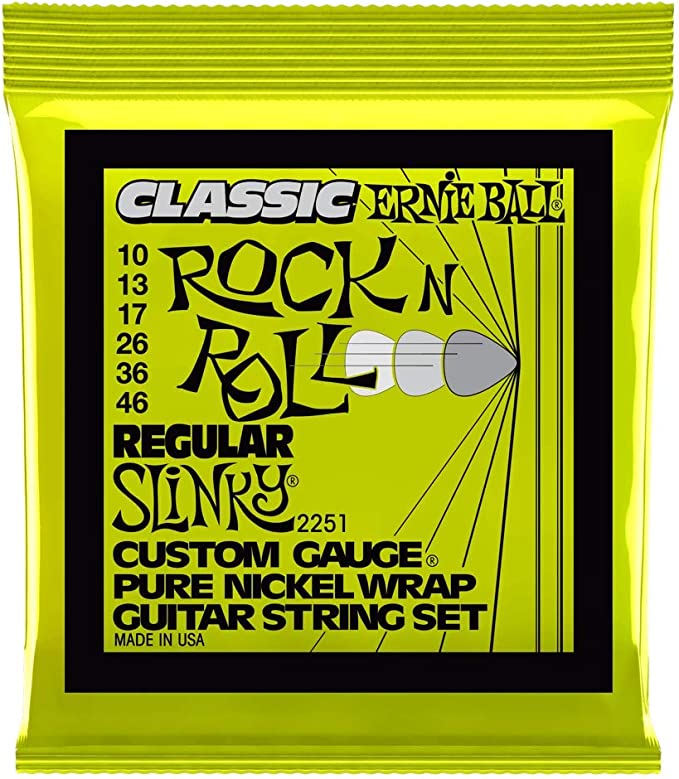
Ernie Ball’s Regular Slinky Classic Pure Nickel Electric Guitar Strings are a set of high-quality strings with a gauge ranging from 10 to 46.
These strings have a rich history, as pure nickel was the material of choice for electric guitar strings in the 1950s and 1960s.
This choice of material gives the strings a warm, vintage tone that appeals to musicians across various genres.
As an industry standard, the Regular Slinky’s 10-46 gauge is preferred by many guitarists due to its signature feel.
These strings are made in California, USA, using only the finest and freshest materials.
The manufacturing process includes wrapping pure nickel around a tin-plated high-carbon steel core to produce a unique sound that complements different playing styles, such as jazz, rock, and blues.
Ernie Ball packages each set of strings in an ultra-low humidity environment, using their element shield packaging to ensure that every set remains fresh and retains its quality until it’s used.
This attention to detail and quality makes these strings popular among guitar enthusiasts.
- My Review
I’ve recently tested the Ernie Ball Regular Slinky Classic Pure Nickel Electric Guitar Strings and I must say, their performance truly impressed me.
These strings have a gauge range of 10-46, which balances playability and tone.
In addition, the nickel material gives them a warm, vintage sound that works well for various genres, such as jazz, rock, and blues.
The first thing I noticed when playing with these strings was their signature Slinky feel, making them comfortable and easy on my fingers.
They have a smooth texture and respond well to different playing techniques, such as bends and slides.
When it comes to tuning, these strings require a bit of a break-in period, but the process can be sped up by stretching them with your thumbs away from the guitar neck and returning them a few times.
Once they were settled in, I found that they held their tuning quite well, and I didn’t experience any issues with slippage or instability.
As for the tone, it’s warm, rich, and reminiscent of classic rock ‘n’ roll.
These strings bring out the best of my guitar’s natural sound and complement its tonal qualities.
I also appreciate the durability of the tin-plated high-carbon steel core, which ensures that these strings last a good amount of time before needing to be replaced.
One downside I encountered was that, although rare, a string might break during the initial tuning process.
This could be due to a manufacturing defect or bad luck, but it’s worth being cautious when installing the strings first.
Here are the ratings I’ll give to the Ernie Ball Regular Slinky Classic Pure Nickel Electric Guitar Strings:
In my experience with the Ernie Ball Regular Slinky Classic Pure Nickel Electric Guitar Strings, I found them to be a solid choice for guitarists seeking a warm, vintage tone and a comfortable playing experience.
Despite the occasional string breakage, these strings offer great value for their price and are a reliable option for various playing styles.
- Pros:
- Warm, vintage tone.
- Signature Slinky feel.
- Durable and high-quality materials.
- Cons:
- Initial break-in period required.
- Possible string breakage during tuning.
- No color-coded strings.
My final verdict is that the Ernie Ball Regular Slinky Classic Pure Nickel Electric Guitar Strings are a reliable, high-quality choice for guitarists seeking a warm, vintage tone and a comfortable playing experience.
With minor drawbacks, such as the initial break-in period and possible string breakage during tuning, these strings still offer great value and performance for various playing styles.
GHS Strings GB-DGF David Gilmour Signature Series Strings
GHS Strings for electric, acoustic, and bass guitars with factory-fresh Nitro-Pack singles.
GHS Strings provide freshness and excellence for electric, acoustic and bass guitars with their Nitro-Pack singles and Boomers series. The David Gilmour Signature set offers a bright, long-lasting tone with a roundwound nickel-plated steel wrap. Easy to use and factory-fresh, these strings are perfect for any musician.
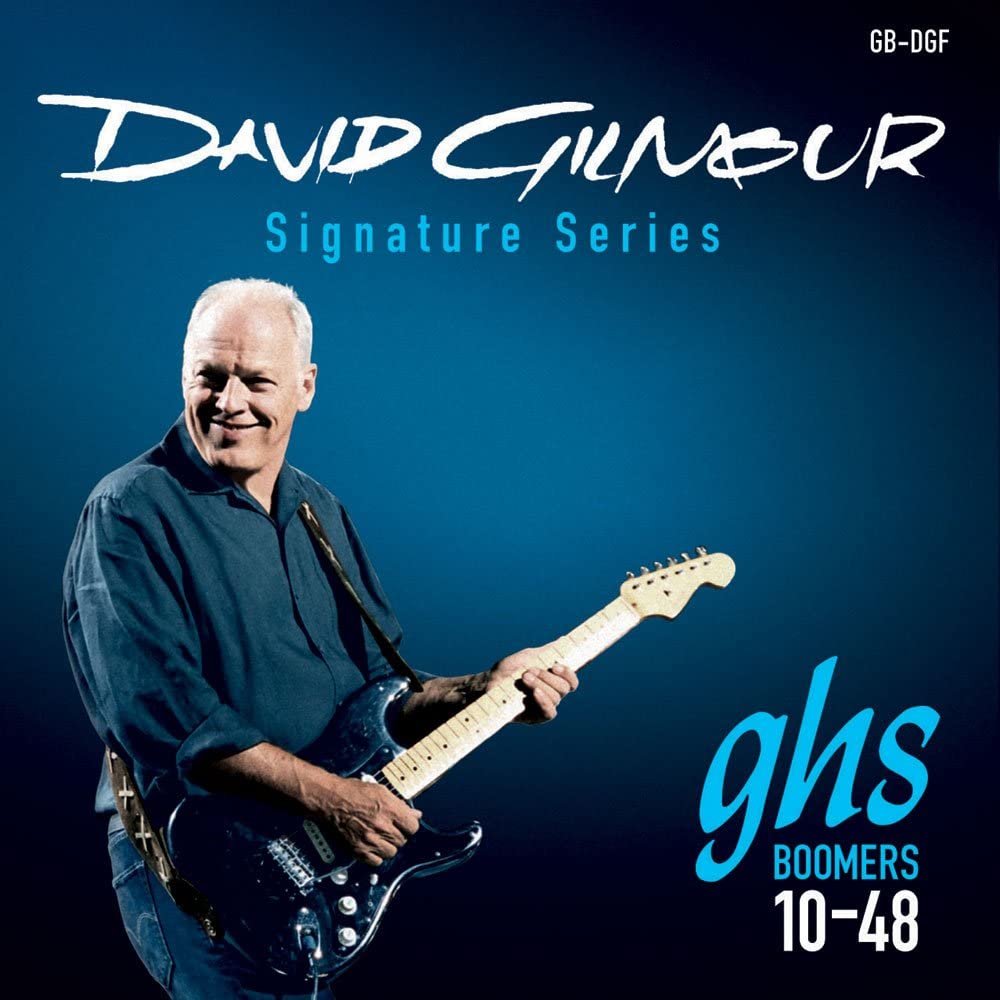
Introducing the David Gilmour Signature Series GB-DGF, a set of nickel-plated electric guitar strings designed by GHS Strings.
This model features customized gauges that David Gilmour has used since Pink Floyd’s “The Wall.” Known for their brilliant tone and powerful attack, these strings are perfect for musicians of all genres.
The set includes the following gauges: .010, .012, .016, .028, .038, and .048, also known as the “Blue” set.
Crafted with nickel-plated steel wrapped tightly around a round core wire, these strings deliver a bright, long-lasting tone.
As part of GHS Strings’ commitment to quality, each string is sealed in a nitrogen environment within a tear-resistant sleeve, ensuring they remain fresh and corrosion-free.
Manufactured in a state-of-the-art facility using only the purest materials, these strings are designed to withstand the test of time.
The David Gilmour Signature Series is suitable for Fender Stratocasters and Gibson Les Pauls, offering players an exceptional playing experience with rich sound and durability.
- My Review
After getting my hands on the David Gilmour Signature Series GB-DGF nickel-plated electric guitar strings from GHS Strings, I can confidently say that they have an exceptional quality.
These strings have a unique combination of gauges that provide a brilliant tone and powerful attack, which I found to be perfect for various genres of music.
Upon installing the strings on my Fender Stratocaster, I noticed they differed from other brands I’ve used.
They were somewhat slippery at first, but once I got used to them, I found that they had a nice feel and made playing smooth and enjoyable.
I also tried them on my Gibson Les Paul; they sounded fantastic there.
One thing that stood out to me was the packaging.
Each string is sealed in a nitrogen environment, ensuring it stays fresh and corrosion-free.
This attention to detail and commitment to quality makes a noticeable difference in the overall performance and longevity of the strings.
However, I did encounter a few issues.
While the strings generally held their tune well, I experienced some difficulty with the high E string.
It broke during a gentle stretch after installation, which was quite disappointing.
I’ve used other brands before and have never had a string break during the initial stretching process.
This could be an isolated incident or a quality control issue with the thinner strings.
Despite this setback, I found the overall sound and playability of the David Gilmour Signature Series GB-DGF strings to be quite enjoyable.
Here are the ratings I’ll give to the GHS Strings GB-DGF David Gilmour Signature Series Strings:
The rich tones on my Stratocaster and Les Paul were impressive.
While the issue with the high E string was unfortunate, I would still consider giving these strings another chance, as their unique gauges and tonal qualities offer a playing experience that’s hard to find elsewhere.
- Pros:
- Brilliant tone and powerful attack.
- Nitrogen-sealed freshness and corrosion-free.
- Great for various musical genres.
- Cons:
- High E string may break easily.
- Slippery feel initially.
- Possible quality control issues.
My final verdict is that the David Gilmour Signature Series GB-DGF nickel-plated electric guitar strings by GHS Strings offer a unique playing experience with their brilliant tone, powerful attack, and excellent sustain.
Despite some drawbacks, such as the high E string breaking easily and a slightly slippery initial feel, these strings are worth considering for guitarists seeking a fresh and versatile option for their instrument.
Dunlop DEN1046 Medium Nickel Wound Electric Guitar Strings
High-quality, balanced strings for electric guitar.
Dunlop Strings are made with strict quality control measures in a climate-controlled facility for freshness and balanced string-to-string tension. Manufactured in Benicia, California U.S.A., Dunlop Strings offer an exceptional musical experience.
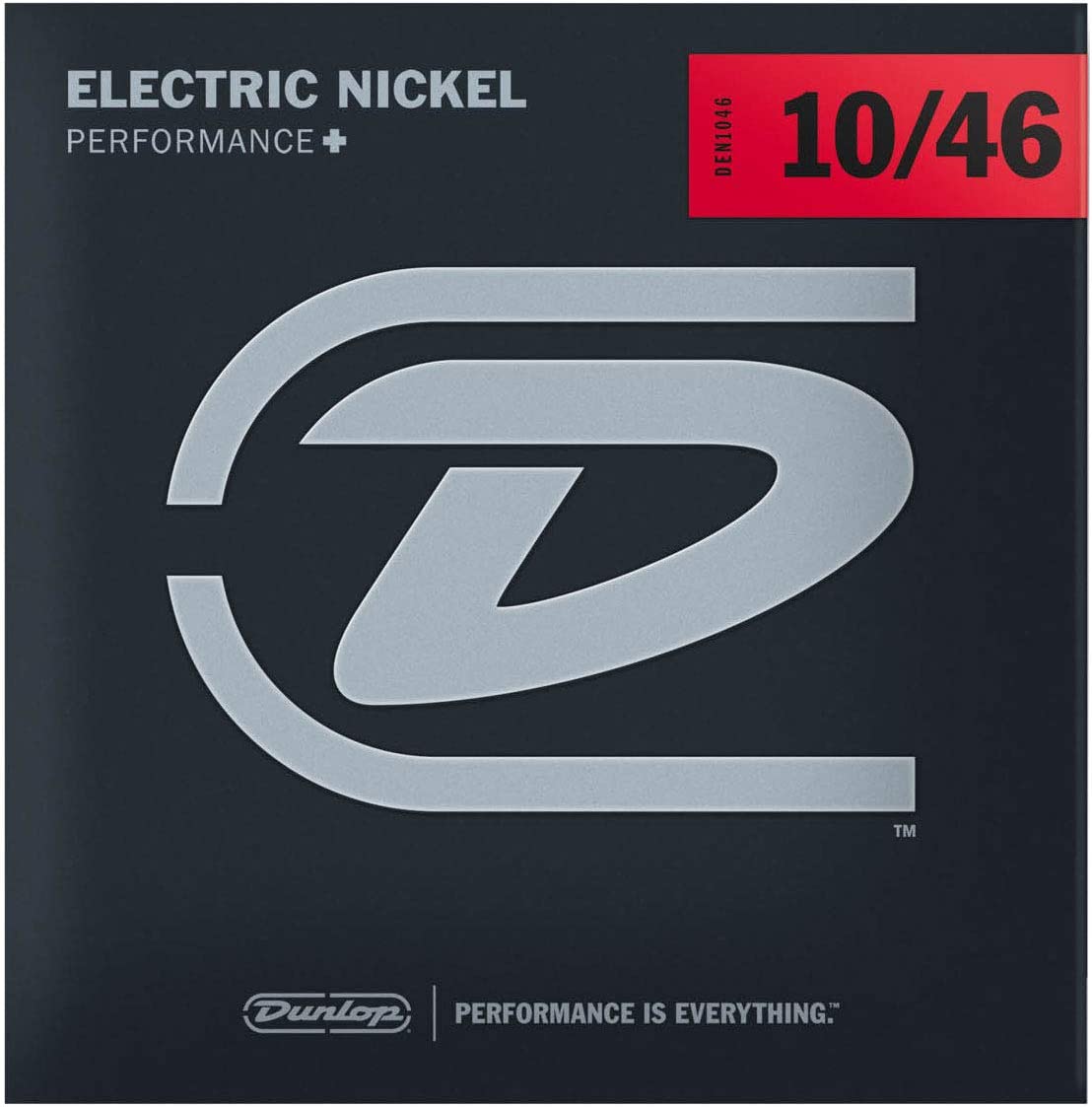
Dunlop DEN1046 Medium Nickel Wound Electric Guitar Strings are designed for those seeking a warm, aggressive midrange, quick attack, and well-defined low end.
These 6-string electric guitar strings come in a medium gauge, ranging from 0.10 to 0.46, and are crafted to provide a smooth playing feel.
Made in Benicia, California, these strings are a product of Jim Dunlop’s dedication to quality and attention to detail.
Established in 2005, the company has entered the string business and thrived in it.
Their meticulous manufacturing process ensures the raw materials are in perfect condition at every step.
Their strict inspection, storage, and handling regulations guarantee that the strings remain fresh until they reach the player.
Balanced from string to string and set to set, Dunlop strings are manufactured in a climate-controlled facility, ensuring consistency and reliability.
With the Dunlop DEN1046 Medium Nickel Wound Electric Guitar Strings, you can expect an enhanced musical experience, whether you’re a professional musician or just starting.
- My Review
I recently tested the Dunlop DEN1046 Medium Nickel Wound Electric Guitar Strings and was thoroughly branded with their performance.
These strings have a fantastic tonal quality, providing a warm and aggressive midrange that allows my guitar to easily cut through the mix.
In addition, the quick attack and well-defined low end make them perfect for various playing styles, from fingerpicking to heavy strumming.
One of the things that stood out to me was the smooth feel of these strings.
They were comfortable to play, even during extended practice sessions, which is essential for any serious musician.
I also appreciated the balanced tension across all six strings, providing a consistent playing experience and making it easier to maintain intonation.
The fact that these strings are made in a climate-controlled facility in Benicia, California, speaks volumes about the level of care and attention to detail that goes into their production.
This ensures that each set of strings I receive is as fresh as the day they were made, resulting in improved longevity and consistent quality.
While I enjoyed the performance of these strings, I found that they took a little longer to settle in and stay in tune compared to some other brands I have used.
However, the tuning stability was excellent once they were broken in, and I didn’t encounter any issues.
Despite the minor break-in period, the Dunlop DEN1046 Medium Nickel Wound Electric Guitar Strings offer an exceptional playing experience.
They deliver a perfect combination of tonal warmth, aggressive midrange, and defined low end, ideal for a wide range of musical genres.
Here are the ratings I’ll give to the Dunlop DEN1046 Medium Nickel Wound Electric Guitar Strings:
Not to mention, the smooth feel and balanced tension make them a pleasure to play.
I highly recommend these strings to anyone looking to enhance their guitar’s sound and feel.
- Pros:
- Warm, aggressive midrange.
- Quick attack and defined low end.
- Smooth feel and balanced tension.
- Cons:
- Longer break-in period.
- Initial tuning stability issues.
- No cons found.
My final verdict is that the Dunlop DEN1046 Medium Nickel Wound Electric Guitar Strings are a fantastic choice for guitarists seeking a warm and aggressive midrange, quick attack, and defined low end.
With their smooth feel, balanced tension, and excellent tonal qualities, these strings will enhance your playing experience and overall guitar sound.
D’Addario Blues/Jazz Rock Nickel Wound Electric Guitar Strings
Bright, reliable tone with D’Addario’s Nickel Wound Electric Guitar Strings.
D’Addario XL Electric Guitar strings provide players of all genres with a bright and powerful sound, due to their nickelplated steel winding. These strings are intonated for excellent performance, making them “The Player’s Choice” for guitarists worldwide.
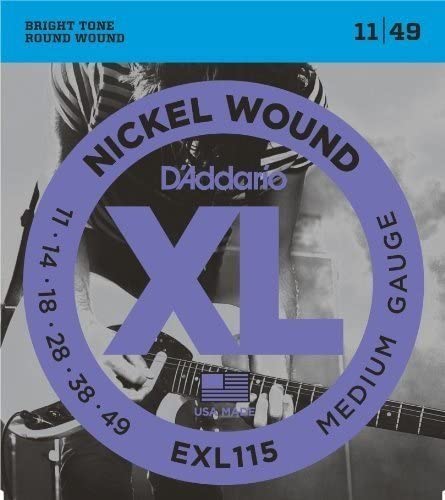
The D’Addario Blues/Jazz Rock Nickel Wound Electric Guitar Strings are popular among guitarists across various genres and styles.
These strings come in a 2-pack and gauge measurements of .011, .014, .018, .028w, .038w, and .049w for the perfect tone balance and playability.
The XL strings are made with nickel-plated steel material that contributes to their bright, distinct sound and exceptional intonation.
These electric guitar strings are designed specifically for blues and jazz-rock and sport a cool blue color.
Created by the well-known brand D’Addario, these coated strings are renowned for their durability and resistance to wear.
Ideal for electric guitars, the strings are crafted with care to ensure that they cater to the needs and preferences of musicians across various skill levels.
By choosing the D’Addario Blues/Jazz Rock Nickel Wound Electric Guitar Strings, you can enjoy a high-quality sonic experience and enhance your guitar’s overall performance.
- My Review
I can attest to their impressive quality and performance as someone who’s tried the D’Addario Blues/Jazz Rock Nickel Wound Electric Guitar Strings.
I found that these strings really stood out, thanks to their bright and distinctive sound, which enhanced my guitar’s overall tone.
As a guitarist who primarily plays blues and jazz-rock, these strings provided the perfect balance of tone and playability.
These strings come in a gauge measurements of .011, .014, .018, .028w, .038w, and .049w, which I found suitable for my playing style.
The nickel-plated steel material significantly provides a distinct, bright sound that I absolutely love.
Moreover, the strings are coated, ensuring their durability and resistance to wear, which means they last longer than many other strings I have tried.
Regarding the brand, D’Addario is a well-known name in the world of guitar strings.
I appreciate the care that goes into crafting these strings, making them a reliable choice for musicians of various skill levels.
One minor downside, though, is the price, which might be a bit steep for some guitarists.
However, considering the quality of these strings, I believe the investment is worth it.
In terms of intonation, I had no issues with these D’Addario strings.
They maintained excellent intonation throughout my playing sessions, allowing me to focus on my music without constantly having to adjust the tuning.
Furthermore, these strings sport a cool blue color, which adds a unique aesthetic touch to my electric guitar.
Here are the ratings I’ll give to the D’Addario Blues/Jazz Rock Nickel Wound Electric Guitar Strings:
In my experience, the D’Addario Blues/Jazz Rock Nickel Wound Electric Guitar Strings have been a fantastic choice for achieving the sound I desire in my music.
The combination of bright tone, excellent intonation, and durability make these strings a worthy addition to any electric guitar setup.
- Pros:
- Bright, distinctive sound.
- Excellent intonation.
- Durable and long-lasting.
- Cons:
- Slightly expensive.
My final verdict is that the D’Addario Blues/Jazz Rock Nickel Wound Electric Guitar Strings are a fantastic choice for musicians who appreciate a bright and distinctive tone, excellent intonation, and durable materials.
These strings’ overall quality and performance justify the slightly higher price.
I highly recommend them to any guitarist who plays blues, jazz, rock, or similar genres.
D’Addario XT Nickel Coated Electric Guitar Strings
Enhanced break resistance and extended string life with natural tone and feel.
XT Nickel coated electric guitar strings deliver advanced corrosion resistance, bright tone, and extended life with NY Steel core, nickel-plated steel wrap wire, and Fusion Twist technology. D’Addario’s Players Circle rewards program also offers exclusive access to BETA testing and promotions.
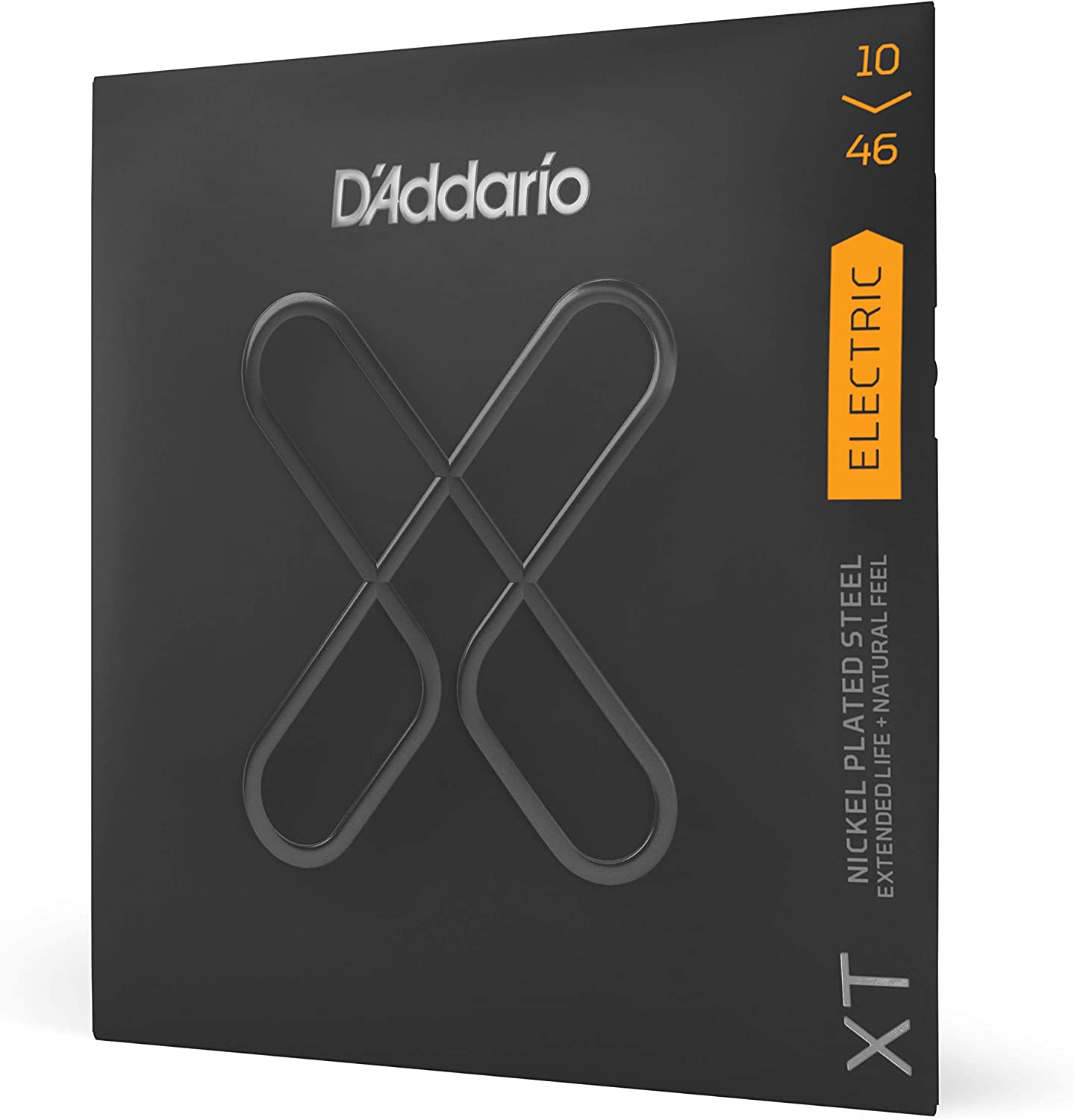
D’Addario XT Nickel Coated Electric Guitar Strings are designed to offer extended life and natural tone, making them a great choice for guitarists who love the feel of uncoated strings but want extra durability.
In addition, these strings boast an advanced corrosion-resistant coating, which prolongs their lifespan without compromising their natural tone and feels.
Their nickel-plated steel wrap wire provides a versatile, bright electric guitar tone suitable for various musical genres.
Thanks to the innovative Fusion Twist technology, the strings offer better-tuning stability, and the NY Steel core wire provides greater break strength.
As a result, these strings can be bent two steps higher and remain well below their breaking point.
D’Addario’s XT Nickel guitar strings also come with a code that can be registered for Players Circle points, rewarding loyal customers.
Made in the USA, these strings are drawn precisely at their New York production facility.
Ideal for 6-string electric guitars, the XTE1046 set comes in a 10-46 Regular Light gauge, providing a good balance between playability and tone.
- My Review
I must say, the D’Addario XT Nickel Coated Electric Guitar Strings had a brilliant performance during my trial.
From the moment I put them on my 6-string guitar, I noticed the corrosion-resistant coating right away, which not only helps extend the life of the strings but also maintains their natural tone and feel.
Unlike some coated strings, these maintained the authentic feel of uncoated strings, which was a delightful surprise.
Regarding tone, I found the nickel-plated steel wrap wire to deliver a versatile and bright sound suitable for a diverse range of musical styles.
In addition, I appreciated the balance of playability and tone in the 10-46 Regular Light gauge, which made playing a breeze.
Regarding tuning stability, I realized that the strings stayed in tune remarkably well, thanks to the Fusion Twist technology.
Additionally, the NY Steel core wire provided impressive break strength.
I intentionally bent the strings two whole steps higher than usual, and they held up nicely without breaking or showing signs of stress.
While the D’Addario XT strings might be priced higher than some other guitar strings, I believe the investment is justified by their durability, tone quality, and overall performance.
Plus, the Players Circle points offer a nice incentive for loyal customers, a thoughtful touch.
However, I found that the strings’ initial brightness might not be to everyone’s liking, and some might prefer a slightly mellower sound.
Here are the ratings I’ll give to the D’Addario XT Nickel Coated Electric Guitar Strings:
Also, the packaging could be improved to prevent the strings from tangling upon unboxing, which can be a minor inconvenience.
In my experience, the D’Addario XT Nickel Coated Electric Guitar Strings have proven to be a reliable, high-quality option for guitar players who desire a long-lasting string set with a great tone and natural feel.
- Pros:
- Extended life with corrosion-resistant coating.
- Bright, versatile tone for various genres.
- Excellent tuning stability and break strength.
- Cons:
- Initial brightness not suitable for everyone.
- Higher price compared to some alternatives.
- Tangling issue with packaging.
My final verdict is that the D’Addario XT Nickel Coated Electric Guitar Strings are an excellent choice for guitarists who prioritize durability, impressive tone quality, and tuning stability.
Despite a few minor drawbacks, their overall performance makes them a worthwhile investment for those seeking a long-lasting and reliable string set.
DR Strings Pure Blues Pure Nickel Wrap Round Core
Rich, vintage-vibe tone with smooth feel and increased sustain.
DR Pure Blues strings provide classic American rock and blues tone, with rich overtones, warm sound and excellent touch sensitivity for an effortless playing experience. Perfect for guitarists looking to capture vintage vibe.
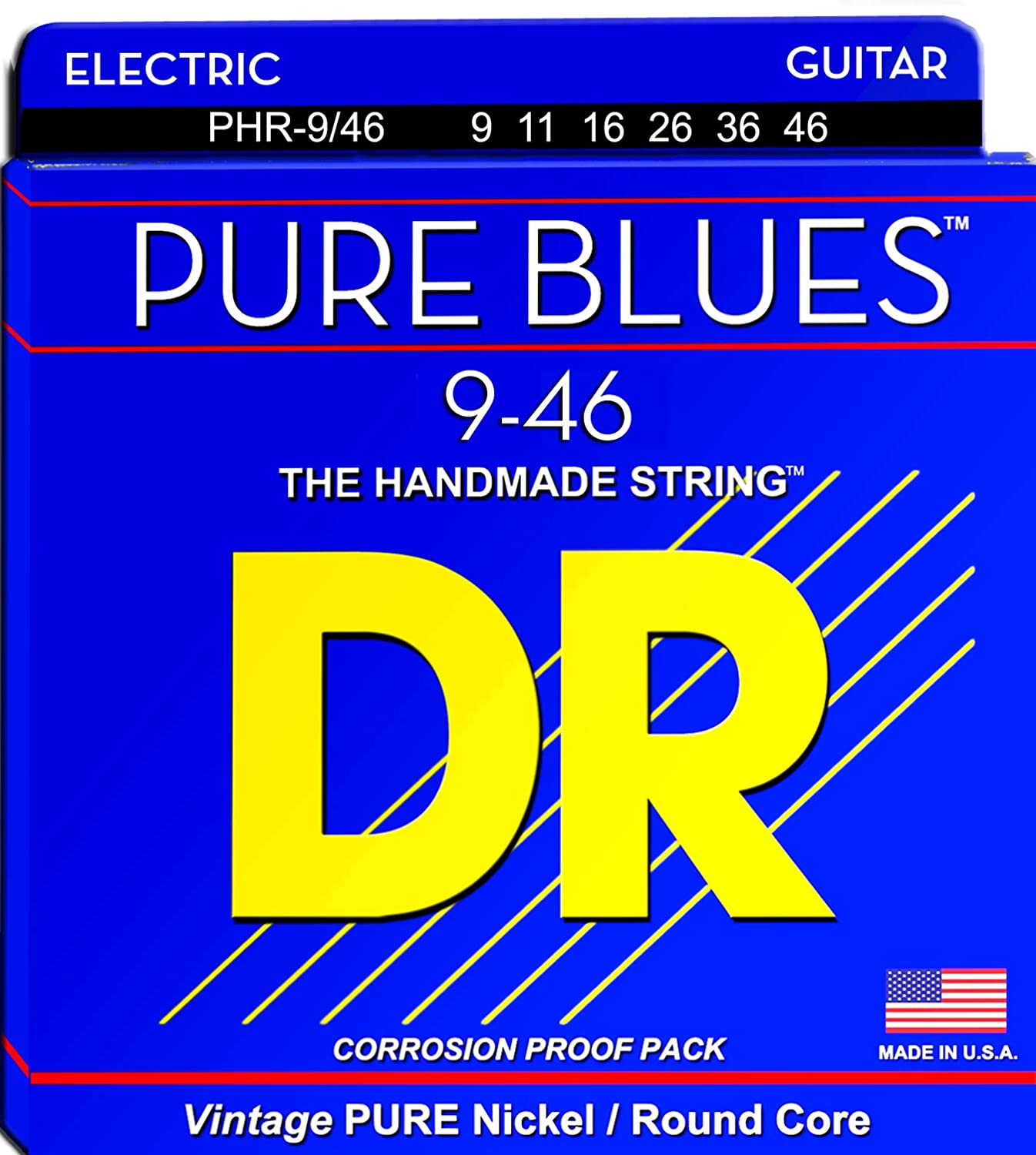
DR Strings Pure Blues electric guitar strings are crafted with a pure nickel wrap wire around a round core wire, which results in a warm, balanced sound with rich overtones and a vintage vibe.
These strings are designed especially for electric Dobro, electric guitar, and slide guitar players, aiming to bring out the classic American rock and blues tone.
Chords played on these strings will have a sweet and round resonance, while lead lines will benefit from increased punchiness and sustain.
In addition, the strings feel smooth and comfortable to play, providing a remarkably responsive touch.
With their light gauge and nickel construction, DR Strings Pure Blues are easier on your guitar frets and make bending notes more effortless.
The DR Pure Blues has six strings with gauges 9, 11, 16, 26, 36, and 46.
The strings are coated, which helps preserve their sound and longevity.
Players seeking a vintage sound and feel for their electric guitar will appreciate the unique characteristics of these pure nickel strings.
- My Review
After trying out the DR Strings Pure Blues Pure Nickel Wrap Round Core strings on my electric guitar, they deliver an exceptional playing experience with vintage warmth and character.
When strung them up, I noticed a distinctive, warm, and balanced sound that produced rich overtones and gave off that sought-after vintage vibe.
When playing chords, I observed that they rang out sweet and round, while lead lines had extra punchiness and sustained.
In addition, these strings felt incredibly smooth and comfortable to play with, and their responsiveness to my touch was remarkable.
One of the aspects I appreciated about these strings was their light gauge and pure nickel construction.
They gave my guitar a unique tonal quality and made bending notes more effortless and gentler on my frets, ensuring a longer lifespan for my instrument.
Moreover, the DR Strings Pure Blues come coated, which helps preserve their sound and longevity.
This was an especially welcome feature, as I tend to play quite often and need strings that can withstand extended periods of use.
Having tried various other strings on the market, I can confidently say that the DR Strings Pure Blues stand out for their vintage tone, smooth playability, and impressive touch sensitivity.
Here are the ratings I’ll give to the DR Strings Pure Blues Pure Nickel Wrap Round Core:
However, it’s essential to remember that guitar strings are a very personal choice, and what might work for my playing style and sound preference might not be suitable for everyone.
That being said, I highly recommend trying these strings if you’re looking for a vintage sound with a warm, balanced tone and excellent playability.
- Pros:
- Warm, balanced vintage tone.
- Smooth playability and touch responsiveness.
- Durable pure nickel construction.
- Cons:
- Not suitable for all playing styles.
- Potential issues with string unwinding.
- Some users report tuning instability.
My final verdict is that the DR Strings Pure Blues Pure Nickel Wrap Round Core strings are an excellent choice for guitarists seeking a warm, balanced vintage tone with smooth playability and touch responsiveness.
Their pure nickel construction ensures durability and a unique sound.
However, remember that they may not be suitable for all playing styles, and some users have reported issues with string unwinding and tuning instability.
These strings offer great value and are worth trying for those searching for that classic American rock and blues sound.
Ernie Ball Regular Slinky Nickel Wound Electric Guitar
Legendary sound with Ernie Ball Slinky Strings.
Ernie Ball Slinky strings provide iconic tone, long life, and a balanced sound for all guitar types and playing styles. Nickel-plated steel is wound around a tin-plated high-carbon steel core for iconic Slinky sound, while plain strings feature lock twists for enhanced stability.
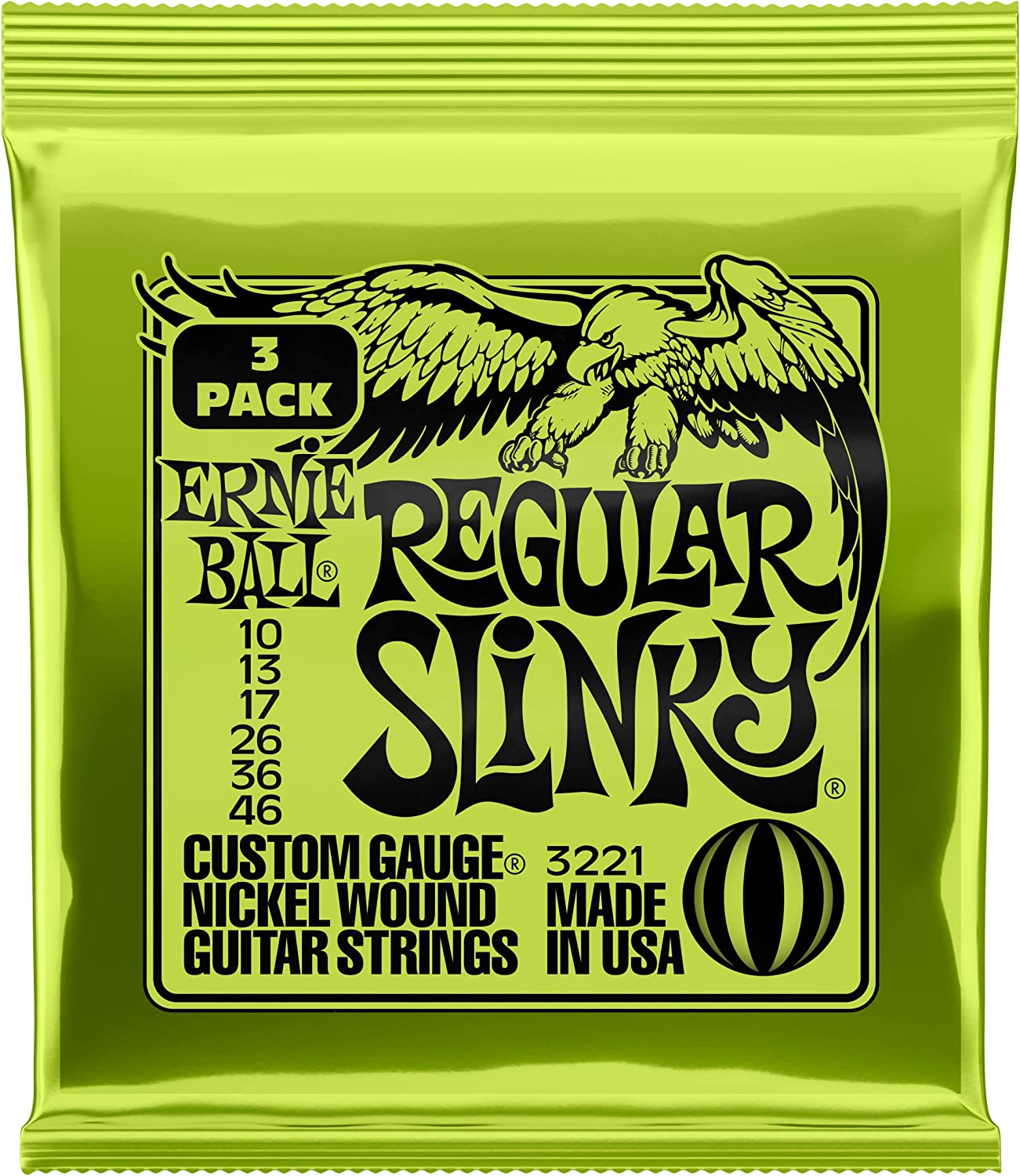
Introducing Ernie Ball’s Regular Slinky Nickel Wound Electric Guitar Strings, available in a convenient 3-pack with a 10-46 gauge. The Regular Slinky 10-46 gauge has become an industry standard due to its versatility and adaptability for different play styles.
Ernie Ball takes pride in the quality of its strings, which boast a bright and balanced tone.
Each set comes individually wrapped in Element Shield Packaging to ensure that the strings remain fresh and maintain their longevity.
Crafted from nickel-plated steel wire wrapped around a tin-plated high-carbon steel core, these strings deliver a harmonious tone suitable for all guitar types and playing styles.
The brand has been manufacturing top-quality electric guitar and bass strings since 1962, continually enhancing the playing experience for musicians worldwide.
Choose Ernie Ball Regular Slinky Nickel Wound Electric Guitar Strings for a reliable and exceptional performance every time you play.
- My Review
Having tried the Ernie Ball Regular Slinky Nickel Wound Electric Guitar Strings in a 10-46 gauge, I can confidently say these strings live up to their reputation.
Not only do they provide a bright and balanced tone, but they also offer great playability on various types of electric guitars.
One of the standout features of these strings is their durability.
The nickel-plated steel wire wrapped around the tin-plated high-carbon steel core ensures that it can withstand regular use and maintain its tonal qualities.
The Element Shield Packaging is crucial in prolonging string life and keeping them fresh as new.
I found that these strings cater to various playing styles, making them suitable for musicians from different genres.
Whether you enjoy playing rock, blues, or metal, the versatile 10-46 gauge offers enough flexibility for smooth bending and comfortable chord holding.
However, I noticed that the strings might need some time to settle in after installation.
This could require minor tuning adjustments during the initial days of use; however, once they have settled, their tuning stability is impressive.
While Ernie Ball has had a long-standing reputation for producing high-quality guitar strings since 1962, it’s important to remember that personal preferences may vary.
Some players may prefer heavier or lighter gauges depending on their playing style or the specific sound they aim for.
The Regular Slinky Nickel Wound Electric Guitar Strings offer an excellent balance between tone and playability that many guitarists will appreciate.
Here are the ratings I’ll give to the Ernie Ball Regular Slinky Nickel Wound Electric Guitar:
In my experience with these strings, I found them reliable and consistently delivering exceptional performance.
They may not be everyone’s cup of tea, but for those seeking a versatile set of strings with a bright and balanced tone, Ernie Ball Regular Slinky Nickel Wound Electric Guitar Strings are certainly worth considering.
- Pros:
- Bright, balanced tone.
- Durable and long-lasting.
- Versatile gauge for various styles.
- Cons:
- Initial tuning adjustments needed.
- Not suitable for all preferences.
- Potential for occasional inconsistency.
My final verdict is that the Ernie Ball Regular Slinky Nickel Wound Electric Guitar Strings are a reliable and high-quality choice for musicians seeking a versatile set of strings with a bright and balanced tone.
In addition, their durability, material, and performance make them an excellent option for various playing styles and genres.
D’Addario XL Pure Nickel Electric Guitar Strings
Rich, warm vintage sound with rewards, solderless install and noiseless pickups.
D’Addario XL Pure Nickel strings deliver a classic ’50s electric guitar sound with increased volume, slightly more tension and resistance, and are made with a high carbon steel core and pure nickel wrap wire. Join Players Circle to get rewarded with free stuff and exclusive access to new products.
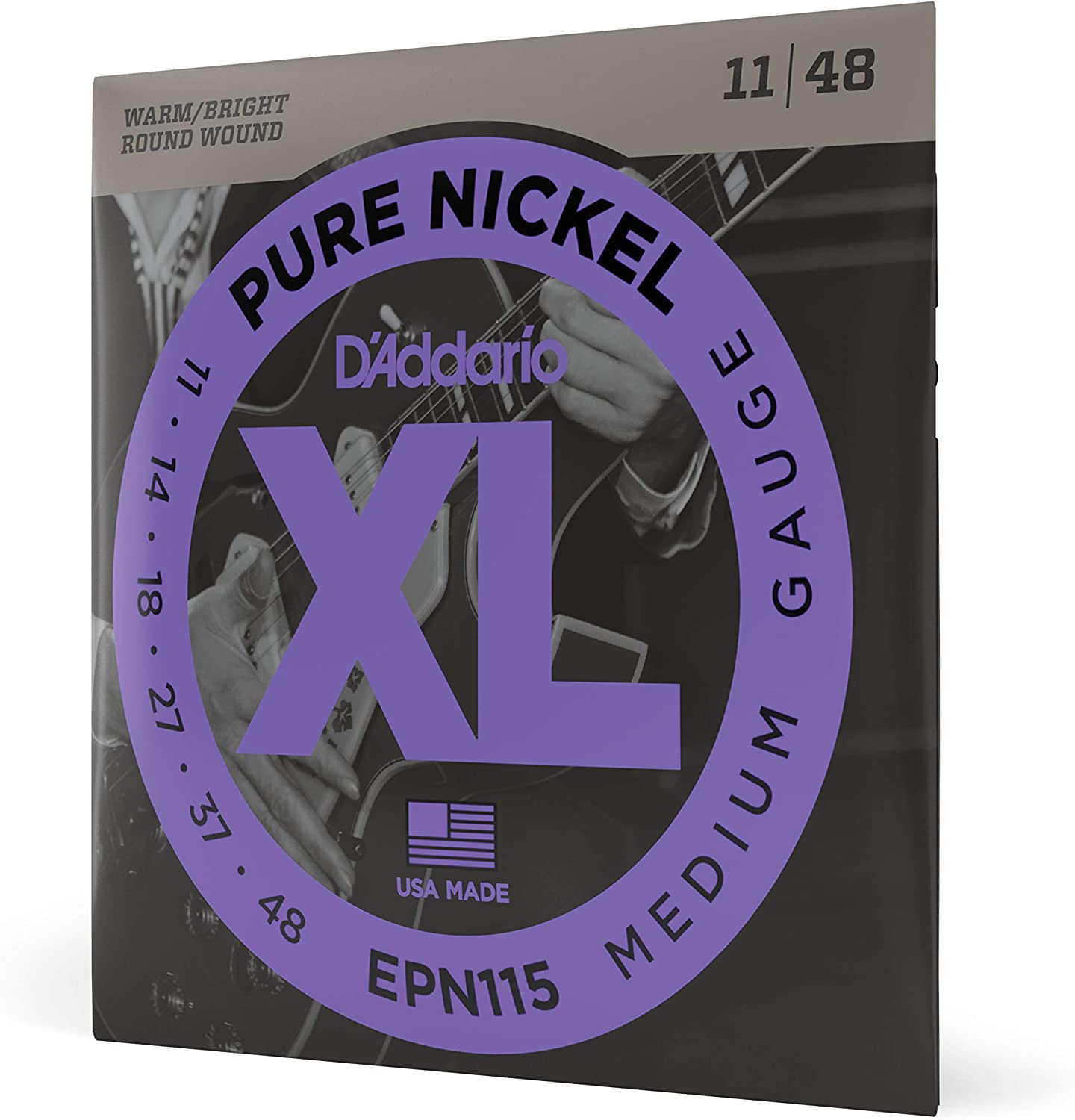
The D’Addario Guitar Strings – XL Pure Nickel Electric Guitar Strings are designed to provide a vintage tone reminiscent of the 1950s.
These strings produce a warm, bright, rich sound perfect for blues, jazz, and early rock & roll.
The strings are made with a high carbon steel hex-core and a pure nickel wrap wire, ensuring perfect intonation, a consistent feel, and reliable durability.
D’Addario is an American brand known for its quality and consistency in the musical instrument strings industry.
Their XL Pure Nickel Electric Guitar Strings are compatible with electric guitars in a custom gauge with brown color.
The product packaging includes a recyclable VCI bag featuring a code that can be registered on D’Addario’s Players Circle platform to earn reward points.
These strings are manufactured in the USA at their New York production facility using state-of-the-art machinery for unmatched performance.
- My Review
Upon trying the D’Addario Guitar Strings – XL Pure Nickel Electric Guitar Strings, I immediately noticed their vintage tone that harkens back to the 1950s, transporting me to a time of early blues, jazz, and rock & roll music.
The warm, bright, and rich sound these strings produce is perfect for guitarists who appreciate a classic vibe in their playing.
One key aspect that stood out was the high carbon steel hex-core and pure nickel wrap wire construction.
This design ensured perfect intonation, a consistent feel, and impressive durability throughout my playing sessions.
D’Addario takes pride in crafting quality strings that sound great and last.
The custom gauge with brown color added an appealing visual element to my electric guitar.
Furthermore, the nickel string material provided a unique and comfortable playing experience that felt smooth on my fingers.
As I strummed away, I enjoyed these strings’ rich tonal qualities, enhancing my overall performance.
D’Addario’s innovative packaging further impressed me.
The recyclable VCI bag with a code for registering on their Players Circle platform is an excellent way to earn reward points while promoting eco-friendly practices.
It’s refreshing to see a company pay attention to the quality of its products and its environmental impact.
However, it’s worth noting that these strings may not be ideal for every guitarist or guitar type.
Some players may find them too thick or unbalanced for their preference or specific instrument setup.
Here are the ratings I’ll give to the D’Addario XL Pure Nickel Electric Guitar Strings:
In such cases, exploring different gauges or string materials might be necessary to find the perfect fit.
In my experience with the D’Addario XL Pure Nickel Electric Guitar Strings, they delivered an exceptional vintage tone and feel while offering reliable durability – making them a worthwhile consideration for those seeking a warm and nostalgic sound for their electric guitar.
- Pros:
- Authentic vintage tone and sound.
- Durable hex-core and pure nickel construction.
- Eco-friendly packaging with reward points.
- Cons:
- May not suit all guitar types/players.
- Potentially unbalanced for some preferences.
- Limited gauge options available.
My final verdict is that the D’Addario XL Pure Nickel Electric Guitar Strings are an excellent choice for guitarists seeking a vintage tone and high-quality material.
With their impressive durability, warm tone, and precise intonation, these strings provide a satisfying playing experience for those who appreciate the nostalgic sound of the 1950s.
What to consider before buying guitar strings for blues?
Blues music has a rich history and has given rise to some of the most iconic guitarists in the world.
From legends like B.B. King, Muddy Waters, and Stevie Ray Vaughan, blues guitar players have incredibly distinctive tones.
Players must consider several factors when selecting guitar strings to achieve the desired blues sound.
We will discuss eight significant factors to consider before buying guitar strings for blues:
– String material:
One of the most critical factors to consider when purchasing guitar strings for blues is their material.
The material directly affects the strings’ tone, feel, and durability, which are vital for blues players.
There are two main types of guitar strings: steel and nylon.

Nylon strings are commonly found on classical guitars, while steel strings are more suited for acoustic and electric guitars.
The most commonly used materials for steel-string acoustic and electric guitars are nickel-plated steel, pure nickel, stainless steel, and bronze.
Nickel-plated steel strings are the most popular and are known for their bright and balanced tone, which many blues players love.
On the other hand, pure nickel strings offer a more vintage sound with warm, round, and softer tones.
In addition, stainless steel strings are known for their durability and bright, crisp tones, while bronze strings offer a more traditional acoustic guitar sound that is warm and bright.
– Tension of the Strings:
Another essential factor to consider when choosing guitar strings for blues is the string’s tension.
The tension of a guitar string greatly impacts its playability, tone, and how it responds to your playing.
Tension is typically measured as light, medium, or heavy.
Lighter tension strings are easier on the fingers and bend, providing more ease with techniques like string bending and vibrato, commonly used in blues.
However, lighter tension strings can sometimes result in a thinner tone and less control over your playing.
Medium tension strings offer a nice balance between ease of playability and control.
While they can require more effort to bend and play than lighter strings, they provide a more robust and fuller tone with greater control.
Heavy tension strings are generally more challenging to play but offer maximum control and durability.
However, they have a tighter feel and require more finger strength for string bending and vibrato techniques.
Ultimately, your choice of string tension should reflect your playing style, experience level, and personal preference.
– Coating type:
Guitar strings may come with different coatings; uncoated or coated strings.
Coated strings have a thin protective layer that guards against corrosion, dirt, and sweat, extending the strings’ life and maintaining their tone.
Uncoated strings offer a more natural feel and a brighter, more open sound.
However, they tend to require more frequent changes due to corrosion and lack of protection from environmental factors.
Coated strings, while more expensive, provide increased longevity and reduced finger noise on the fretboard.
However, some players claim that coated strings sacrifice some tone and feel, but this comes down to personal preference.
– Gauge of the strings:
The gauge of a guitar string refers to its thickness, which is directly related to its tension.
String gauges are classified as extra light, medium, or heavy sets.
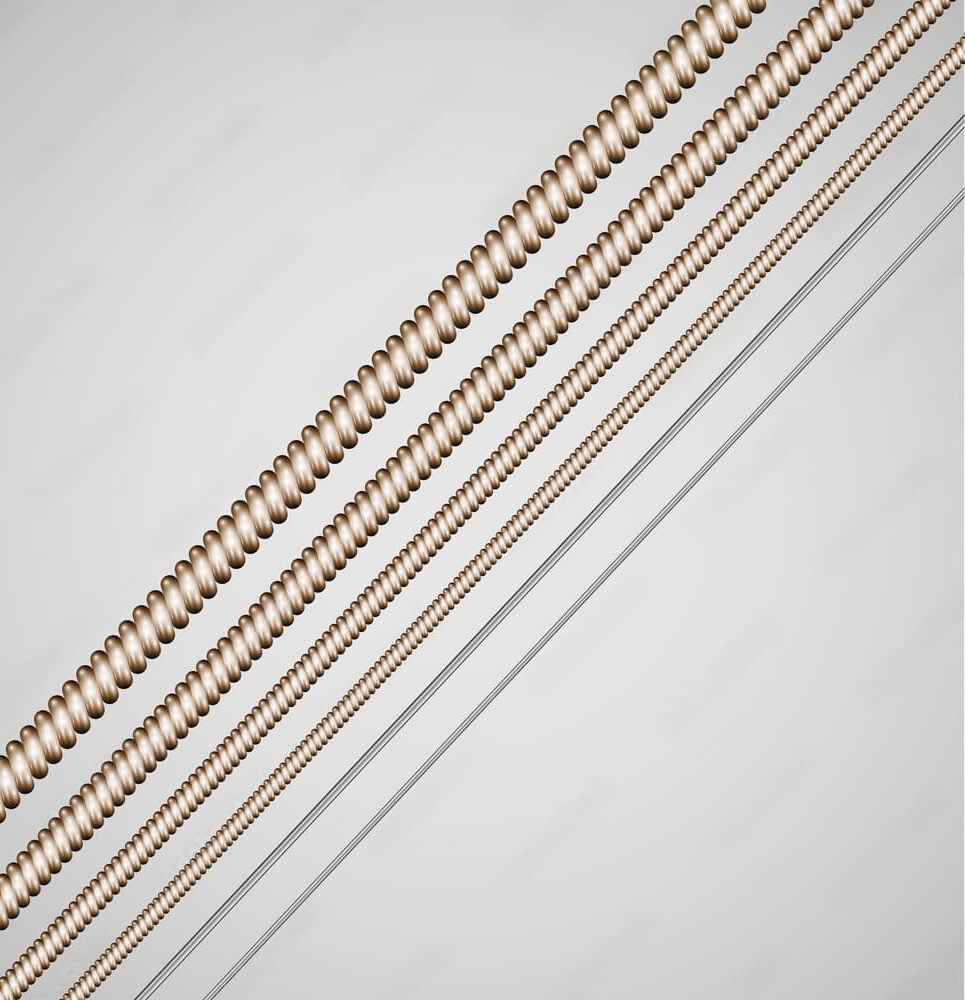
Lighter gauge strings require less tension and are generally deemed easier to play, making them suitable for beginner guitar players.
These strings are also great for blues guitarists due to their ease of bending and the ability to achieve a more expressive sound.
However, some blues players may prefer heavier gauge strings for a fuller, thicker tone that offers more sustain.
Heavier gauge strings can also minimize fret buzz and provide increased durability.
Finding the right gauge for you may require experimenting with different sets until you find the perfect balance between playability, tone, and durability.
– Maintenance and durability:
The lifespan of your guitar strings is greatly impacted by factors such as string material, coating type, and how well you maintain them.
Guitar strings can wear out and lose tonal quality over time, making regular maintenance and replacement crucial.
Regularly cleaning your guitar strings with a clean cloth or string cleaner should be part of your routine to prevent the buildup of dirt and oils.
Additionally, keeping your hands clean before playing and storing your guitar in a humidity-controlled environment can extend the life of your strings.
– Tone and Projection:
The tone a string produces is one of the most crucial aspects of selecting guitar strings for blues.
The string materials, tension, and gauge all affect the tone and projections of the strings.
Blues guitarists typically seek a warm, rich, expressive tone with a wide dynamic range.
Experimenting with different string types and gauges will help refine your desired tone and projection.
To achieve the best sound, it’s important to consider how the strings react to various playing techniques, such as fingerpicking, flat-picking, bends, and slides.
– Brand reputation and quality:
The market is flooded with various guitar string brands, but not all are created equal regarding quality and consistency.
Some popular and well-respected guitar string brands include Ernie Ball, D’Addario, Elixir, Fender, Gibson, and Martin.

When purchasing guitar strings for blues, it’s essential to research different brands and read reviews from fellow blues guitarists to find the brand that aligns with your preferences and desired quality.
– Price and Budget:
Budget is always an important purchase consideration.
Unfortunately, guitar strings’ prices vary widely, from a few dollars for low-quality strings to more than $20 for high-end, coated strings.
Generally, it’s a good idea to invest in higher-quality strings to improve your guitar’s sound and enhance your playing experience.
In addition, higher-priced strings often offer better-quality materials and manufacturing techniques, producing a superior product.
That said, finding strings that balance price and quality to meet your specific budget is essential.
How does string gauge affect your blues playing and tone?
String gauge plays a vital role in shaping the blues playing experience and tone, as it directly impacts various aspects of a guitarist’s playing style, including playability, tone, sustain, tuning stability, and more.
The gauge of a guitar string refers to its thickness, which, in turn, influences the tension needed to bring it to the correct pitch.
Strings are generally classified as extra light, light, medium, or heavy sets, and each gauge has unique characteristics, advantages, and disadvantages.
We will examine how string gauge affects a blues guitarist’s playing technique, tone, and overall performance.
– Playing technique and comfort:
One of the primary effects of string gauge on blues playing is how it influences a guitarist’s playing technique and overall comfort.
Lighter gauge strings are usually easier to fret and bend, making them more comfortable for intricate techniques like string bending, vibrato, and slides widely used in blues music.
On the other hand, heavier gauge strings require more finger strength and effort to manipulate, which can be challenging for some players, especially beginners.
However, some guitarists may prefer the tension and feel offered by heavier strings for their playing style, as it allows for a more aggressive attack and tighter control over the strings.
– Tone and sound character:
String gauge also directly impacts the tone and sound character produced by the guitar.
Lighter gauge strings produce a brighter, more crisp sound with less sustain.
This brighter tone can be desirable for many blues players who aim to achieve a clear, expressive sound that can cut through the mix in a band setting.
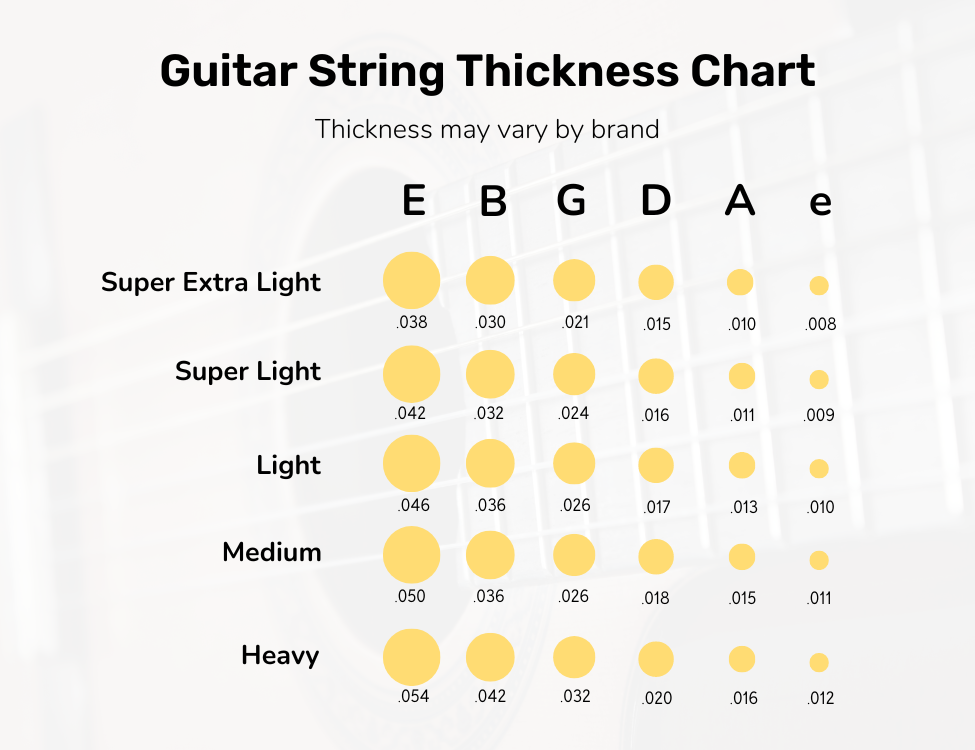
On the other side of the spectrum, heavier gauge strings generally produce a warmer, fuller tone with more depth and sustain.
This thicker and richer tone can be advantageous for blues players who want to emphasize the soulful, dynamic qualities of the genre.
Additionally, heavier strings can provide a more powerful and resonant sound that can enhance the overall expressiveness of the guitar.
– Sustain and Resonance:
Sustain and resonance are essential for blues guitarists who aim to create a rich, full sound that carries emotion.
Heavier gauge strings offer more sustain and resonance, as there is more mass to vibrate and transfer energy to the guitar’s body.
This increased sustain allows individual notes to ring out longer, which can be particularly beneficial for slow blues, where guitarists often hold bends and apply vibrato to sustained notes.
On the other hand, lighter gauge strings generally have less sustain and resonance, giving the illusion of increased attack and clarity.
Some blues players may prefer this quality, as it allows the guitar’s sound to be more articulate, particularly at higher speeds and with intricate techniques.
– Tuning Stability:
String gauge can also influence the guitar’s tuning stability, an important consideration for blues guitarists, as slight changes in tuning can affect the performance significantly.
Heavier strings typically have greater stability in maintaining tuning.
This is mainly due to their increased tension and resistance to changes caused by variations in temperature and humidity.
In contrast, lighter gauge strings are more prone to go out of tune quickly, as they have less tension to keep them in place.
This issue can be particularly problematic for blues guitarists who frequently bend strings, as bending can put additional pressure on the tuning stability.
– Fret and Guitar Neck Wear:
Another factor to consider regarding string gauge is the wear and tear it puts on the guitar’s frets and neck.
The increased tension of heavier gauge strings can contribute to more rapid wear on the frets and potentially result in neck bowing over time, while lighter gauge strings typically cause less strain on these components.
However, some blues guitarists may prefer the increased tension and stiffer feel of heavier strings, despite the potential for increased fret wear.
In this case, balancing personal preference against your instrument’s long-term maintenance and care is essential.
– String noise and control:
Finally, a string gauge can affect the level of string noise generated while playing the guitar.
Lighter gauge strings are generally more prone to producing string noise during fretting and sliding and can be more sensitive to picking hand control.
Due to their increased mass and tension, heavier gauge strings generally produce less string noise and offer greater control over the guitar’s dynamics, allowing blues guitarists to manipulate the sound more accurately to achieve the desired tone.
In conclusion, string gauge plays a significant role in defining the blues playing experience and tone.
Various aspects, such as playability, tone, sustain, tuning stability, fret and guitar neckwear, and string noise and control, are directly affected by the guitar string’s thickness.
Determining the right string gauge for your blues playing should be based on your playing style, technical requirements, and desired tone.
Experimenting with different string gauges and seeking the advice of fellow blues guitar players will enable you to find the perfect strings for your preferences and achieve the unique, expressive sound that characterizes blues music.
Are there any string materials that work best for blues?
When it comes to choosing guitar strings for blues playing, the string materials can significantly impact the feel and responsiveness of the guitar.
With blues being a genre steeped in emotion, expression, and tonal nuance, finding the right string material for your tone and playing style is crucial.
While there is no definitive best material for blues, some string materials are more commonly preferred by blues guitarists for their unique tonal and playing characteristics.
We will explore various string materials and their contribution to the overall sound, playability, and durability while playing blues guitar.
– Nickel-plated steel strings:
Nickel-plated steel strings are among the most popular choices for blues guitarists, as they offer a bright, well-rounded, and articulate tone.
In addition, the nickel plating on the steel core creates a balanced tonal response with smooth midrange frequencies and sparkling highs, making these strings an excellent choice for producing the expressive and articulate sound ideal for blues playing.

Additionally, nickel-plated steel strings are known for their comfortable feel when playing, as the nickel plating provides a slightly smoother surface that is gentler on the fingers than on some other materials.
With the frequent string bending and other techniques used in blues guitar, the playability of nickel-plated steel strings is a significant advantage.
– Pure nickel strings:
Pure nickel strings are another popular choice for blues guitarists, offering a slightly different tonal palette than nickel-plated steel strings.
As the name suggests, these strings are made of solid nickel material rather than featuring a steel core with nickel plating.
With their construction, pure nickel strings produce a warmer, rounder, vintage-sounding tone compared to nickel-plated steel strings.
Pure nickel strings have a softer, more mellow sound with less pronounced high-end frequencies and a more pronounced midrange.
What this does is that it makes them an ideal choice for guitarists who want to recreate classic blues artists’ traditional sounds over, the softer feel of pure nickel strings.
– Stainless steel strings:
Stainless steel strings are another option for blues guitarists due to their unique tonal characteristics and durability.
These strings are made from chromium alloy, contributing to their corrosion resistance and increased lifespan.
In addition, stainless steel strings are known for their bright, crisp, lively tone with a pronounced high-end response.
The tonal clarity of stainless steel strings can be advantageous for cutting through the mix in live settings, while their brightness can be leveraged to produce more aggressive and biting blues solos.
Furthermore, the increased durability of stainless steel strings can make them an attractive choice for gigging musicians who need a reliable string set that stays fresh for longer periods.
– Phosphor bronze strings (for acoustic blues guitar):
For blues guitarists playing acoustic guitars, phosphor bronze strings are popular for their warm, rich, and resonant tone.
Made from a combination of copper and tin alloy with phosphorus added for enhanced durability, phosphor bronze strings provide a well-balanced tone emphasizing lower midrange frequencies, making them well-suited for the blues.
Phosphor bronze strings are famous for their full-bodied and slightly more complex tone than standard bronze strings and perform well for fingerpicking and flat-picking blues styles on acoustic guitars.
However, these strings have a faster oxidation rate, which can lead to a diminished tone over time, requiring more frequent replacement.
– Flatwound strings:
Although less common in modern blues styles, flatwound strings are worth considering for blues guitarists aiming for a unique, vintage sound.
Flatwound strings feature a flat outer wrapping wire, creating a smooth playing surface with reduced finger noise and eliminating the squeaking sounds associated with roundwound strings.
In addition, these strings typically have a warm and mellow tone inspired by traditional jazz and blues guitar sounds of the mid-20th century.
Some blues guitarists turn to flatwounds specifically for their characteristic tone, as they provide a smoother, more muted sound, perfect for more laid-back blues styles.
However, the increased tension and smooth surface of flatwounds can make them more challenging to play than some other string types, particularly in string bending.
Which are the most popular guitar string brands?
Some of the most popular guitar string brands have earned their reputation through consistent quality, innovation, and a wide range of options catering to different instruments, playing styles, and tonal preferences.
These brands are favored by professional musicians and enthusiasts alike, as they provide an excellent playing experience and enhance the sound of their guitars.
Some of the top brands in the market include D’Addario, Ernie Ball, Elixir, Dr Strings, and Dunlop each offering unique characteristics and product lines to suit various needs.
Let’s take a look at each of these individually:
– D’Addario

D’Addario is a leading guitar string manufacturer known for its innovative approach to materials and engineering.
They offer a diverse selection of strings for various instruments, including electric, acoustic, and classical guitars.
The NYXL, EXP, and Pro-Arté series are among their most popular product lines, catering to different playing styles and tonal preferences.
Made in the USA, D’Addario strings are praised for their consistent quality, durability, and performance.
The brand’s commitment to sustainability and eco-friendly practices further enhances its appeal among musicians.
– Ernie Ball
Ernie Ball has been a prominent name in the guitar world for decades, with their iconic Slinky series of electric guitar strings being a favorite among guitarists of all genres.
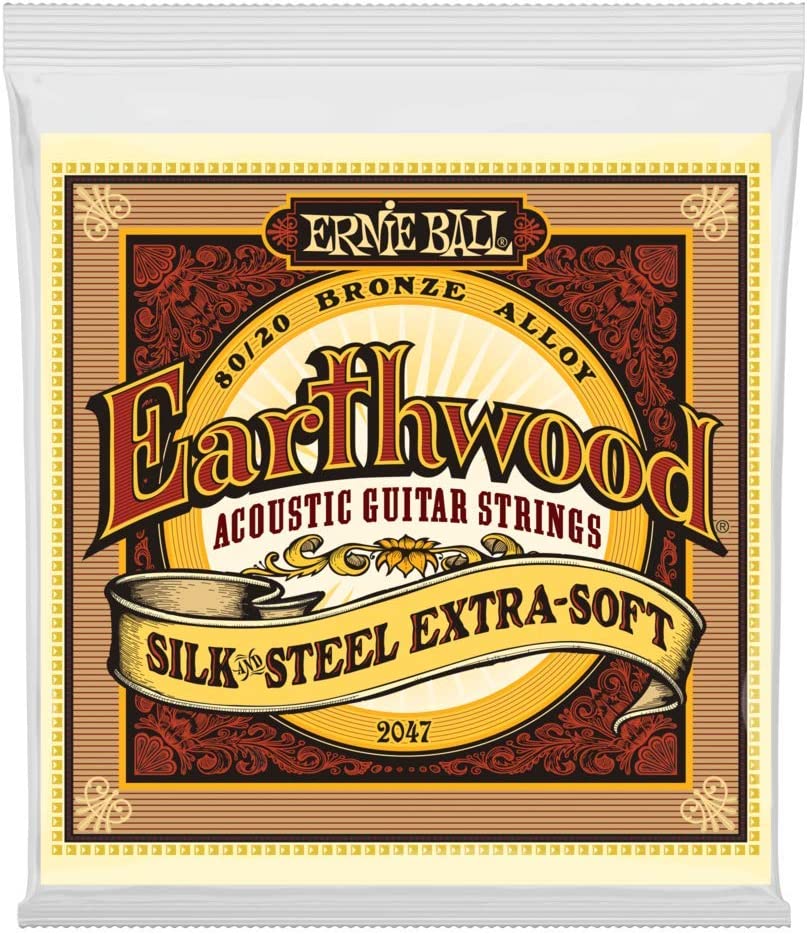
Their extensive product range includes strings for electric, acoustic, and bass guitars, offering various gauges and materials to suit different preferences.
Endorsed by numerous professional musicians, Ernie Ball strings are known for their playability, tone, and longevity.
Popular product lines include Slinky, Cobalt, and Earthwood, each providing unique tonal characteristics.
The brand’s continued dedication to quality and innovation has solidified its position as a top choice for guitarists worldwide.
– Elixir

Elixir revolutionized the guitar string market with their patented coated string technology, providing longer-lasting tone and durability compared to traditional uncoated strings.
They offer strings for electric, acoustic, and bass guitars, with popular series such as Nanoweb, Polyweb, and Optiweb, each featuring different coating materials and tonal properties.
Elixir’s coated strings have garnered a loyal following of guitarists who appreciate their extended lifespan and consistent performance.
The brand’s focus on innovation and quality has made it a go-to choice for players seeking long-lasting strings with minimal maintenance.
Elixir’s commitment to enhancing the guitar playing experience has earned them a well-deserved reputation in the industry.
– Dr. Strings
Dr. Strings, also known as DR Handmade Strings, is a New Jersey-based company that manufactures high-quality guitar strings for bass, electric, and acoustic guitars.

The company was founded by Mark Dronge in 1989, aiming to create handmade strings that offer excellent tone, durability, and playability.
Dr. Strings are crafted using a unique and patented winding process that utilizes machinery designed and built in-house.
The process involves hand-winding the strings on a hexagonal core, which provides a tighter wrap and delivers a longer-lasting string with increased sustain and tone.
The company offers various products, including strings for electric, bass, and acoustic guitars and stringed instruments like banjos and mandolins.
Some of their popular guitar string series are Hi-Beam, Sunbeam, Pure Blues, and Tite-Fit.
Many renowned musicians and bands use Dr. Strings, including Darryl Jones (Rolling Stones), Jeff Ament (Pearl Jam), and Stefan Lessard (Dave Matthews Band), among others.
– Dunlop
Dunlop Manufacturing, Inc. is a California-based company started in 1965 by Jim Dunlop.

Initially focused on manufacturing high-quality guitar accessories, such as capos and slides, Dunlop has expanded to become one of the leading manufacturers of musical instrument strings, pedals, and picks.
Dunlop Strings are manufactured using state-of-the-art machinery, advanced materials, and thorough testing processes.
The company uses diverse materials and gauges to produce strings that cater to various playing styles and preferences.
They offer high-quality strings for electric, acoustic, bass guitars, and other instruments.
Dunlop’s string product line consists of multiple series designed for different tones and playing styles.
Some popular series include the Performance+ Series, the Electric Nickel Wound series, and the Phosphor Bronze Acoustic series.
They also offer specialty strings, such as the Robert Trujillo Icon Series Bass Strings and the Billy Gibbons Reverend Willy’s Electric Guitar Strings.
Dunlop Strings are endorsed by numerous professional players, including Slash (Guns N’ Roses), Jerry Cantrell (Alice in Chains), and Zakk Wylde (Black Label Society, Ozzy Osbourne).
The company is also known for collaborating with musicians to create signature guitar strings.
What’s the difference between coated and uncoated strings?
I understand the confusion and curiosity that beginners have when choosing between coated and uncoated strings.
It happened to me at one point that I had no idea what either of these terms meant.
Let’s dive deep into the differences between these two types of strings, so you can make an informed decision about which ones are right for you.
Coated strings have a thin layer of material, usually a polymer, covering the outer surface of the string.
This coating protects the metal from dirt, sweat, and other contaminants that can degrade the string’s quality over time.
Some brands use proprietary coatings, like Elixir’s NANOWEB or POLYWEB.
One of the primary advantages of coated strings is their extended lifespan.
The protective coating shields the strings from dirt, sweat, and other contaminants, reducing corrosion and wear.
This helps maintain their tone and playability for a longer period.
Additionally, coated strings offer a smoother playing experience, as the coating reduces finger noise and fret-hand friction, making them ideal for beginners or those who prefer a more comfortable feel.
Uncoated strings, on the other hand, lack this protective layer, leaving the metal exposed to the elements.
These strings offer a more raw and authentic tone with a sharper attack, which some players prefer.
Since there is no coating to wear off, uncoated strings can provide a more consistent feel and tone throughout their lifespan.
Here’s a closer look at what it looks when a guitar string is coated:
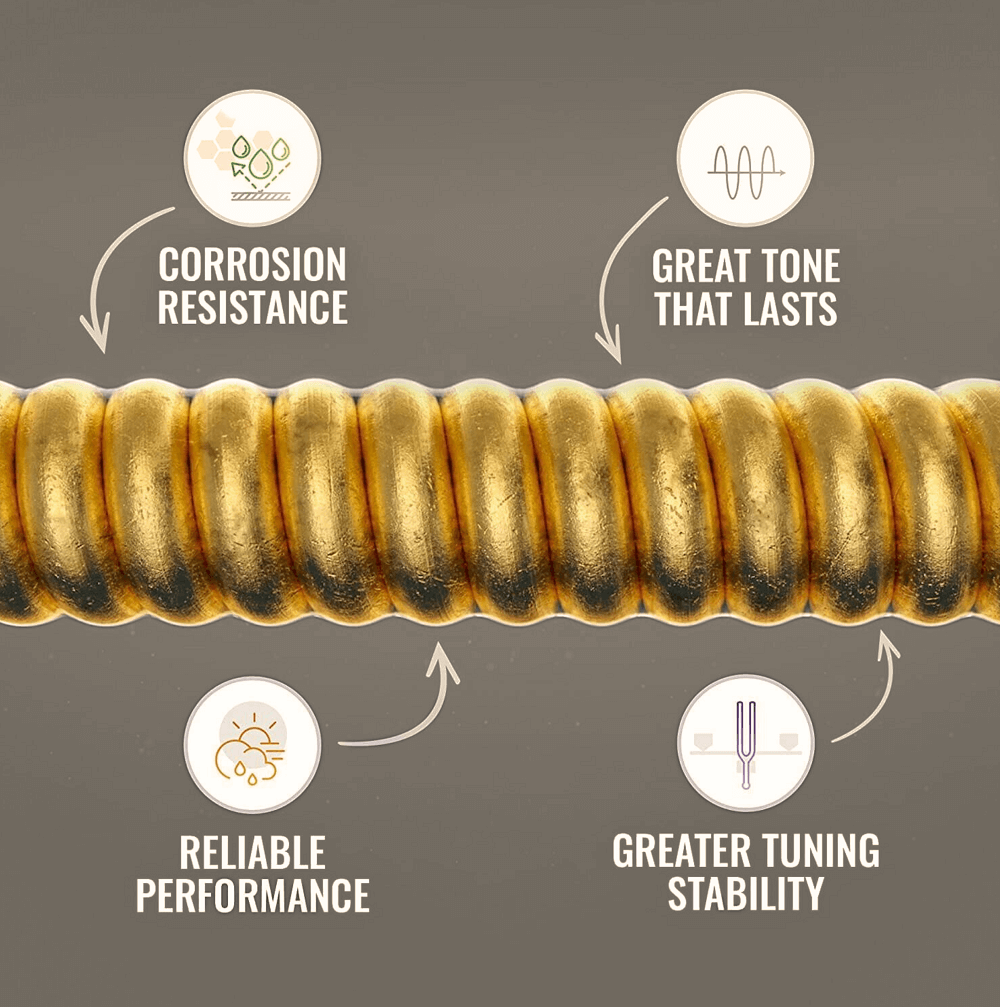
However, uncoated strings are more susceptible to corrosion and wear from sweat, oils, and dirt, which can lead to a shorter lifespan and the need for more frequent string changes.
This can be a drawback for players who don’t clean their strings regularly or those who have particularly acidic sweat.
Additionally, uncoated strings may generate more finger noise and feel less smooth under the fingertips.
Here are some key differences and considerations to keep in mind when deciding between coated and uncoated strings:
– Tone
Coated strings tend to produce a slightly brighter and warmer tone compared to uncoated strings.
This is because the coating dampens some of the higher frequencies, resulting in a smoother sound.
On the other hand, uncoated strings tend to have a more raw, metallic tone with a sharper attack.
The right choice for you will depend on the sound you prefer and the style of music you play.
– Longevity
Coated strings generally last longer than uncoated strings, and this has been proven over time.
The coating protects the string from corrosion and wear caused by sweat, oils, and dirt, and as a result, coated strings maintain their tone and playability for a longer period.
This can be especially helpful for beginner guitarists who may not be as diligent about cleaning their strings regularly.
– Playability
Coated strings often feel smoother to the touch, making them more comfortable to play, especially during long practice sessions.
The coating can also reduce finger noise and make it easier to slide between frets.
However, some players find the slickness of coated strings to be less grippy, which can affect their playing style.
– Price
Coated strings are generally more expensive than uncoated strings, and this is since the added cost comes from the extra manufacturing steps required to apply the coating.
However, since coated strings last longer, you may find that the price difference evens out over time.
– Environmental impact
The coating on coated strings will eventually wear off, potentially releasing microplastics into the environment.
If you’re environmentally conscious, this may be a factor to consider when choosing between coated and uncoated strings.
You may find that coated strings offer a more forgiving playing experience and last longer, making them a more cost-effective option.
But don’t be afraid to give uncoated strings a try if you’re looking for a more raw and authentic tone.
What’s the average lifespan of guitar strings?
The average lifespan of guitar strings can vary greatly depending on factors such as string material, playing frequency, playing style, and maintenance habits.
However, as a general guideline, most guitarists tend to change their strings every 1 to 3 months.
This can translate to approximately 30 to 100 hours of playing time for uncoated strings.
Coated strings, which offer more durability, can last twice as long or even longer, depending on the brand and quality of the coating.
Remember, the lifespan of your guitar strings can be significantly influenced by how well you maintain and care for them.
Keeping your strings clean by wiping them down after each playing session and washing your hands before playing can help prolong their life.
Additionally, storing your guitar in a stable environment with consistent temperature and humidity levels can also contribute to the longevity of your strings.
Do light guitar strings break more easily?
Light guitar strings tend to break more frequently than heavier guitar strings, due to a variety of factors.
Firstly, lighter strings have less mass and tension, making them more prone to damage and breakage when subjected to aggressive strumming or plucking.
Since they have less material to absorb the energy from string vibration, they are more susceptible to wear and tear.
Moreover, the construction and design of your guitar, specifically the bridge and nut, can influence the longevity of your strings.
If the bridge or nut has rough or sharp edges, it may cause more friction and wear on the strings, leading to quicker breakage.
It’s crucial to make sure your guitar is well-maintained and any rough edges are smoothed out to preserve the life of your strings.
Playing style is another significant factor in string breakage.
If you tend to strum or pick the strings with a lot of force or use techniques such as bending, this could increase the likelihood of breaking your strings, particularly lighter ones.
Adjusting your playing style and using a softer touch can help preserve your strings and reduce the occurrence of breakage.
Should you change all guitar strings or just the broken/bad ones?
The common agreement among guitarists is that it is best to replace all strings at once, even if only one or two are in poor condition.
As strings take time to fully stretch, replacing just one may result in it being out of tune with the others, adversely impacting your sound.
Replacing all strings at the same time ensures they have the same level of wear and age, which contributes to a way more consistent sound in my opinion.

Additionally, maintaining your guitar in optimal playing condition is simply a good practice.
On the other hand, if you’re a beginner or don’t play your guitar frequently, you might not need to change all of your strings at once.
In such cases, you might be able to replace only the broken or faulty strings.
I would say this, if you’re a serious player or play your guitar often, it’s recommended to change all your strings at once.
In love with guitars, and gear; expert in all things music! Been writing about guitars for about 5 years and counting. Born in the ’90s. Alma Mater: University of Havana. Always curious, trying to understand the world. #TeamFender

